Visa Traveler
Exploring the world one country at a time

53 countries you can travel VISA-FREE with a Schengen visa [2024 edition]
Updated: March 22, 2024 103 Comments
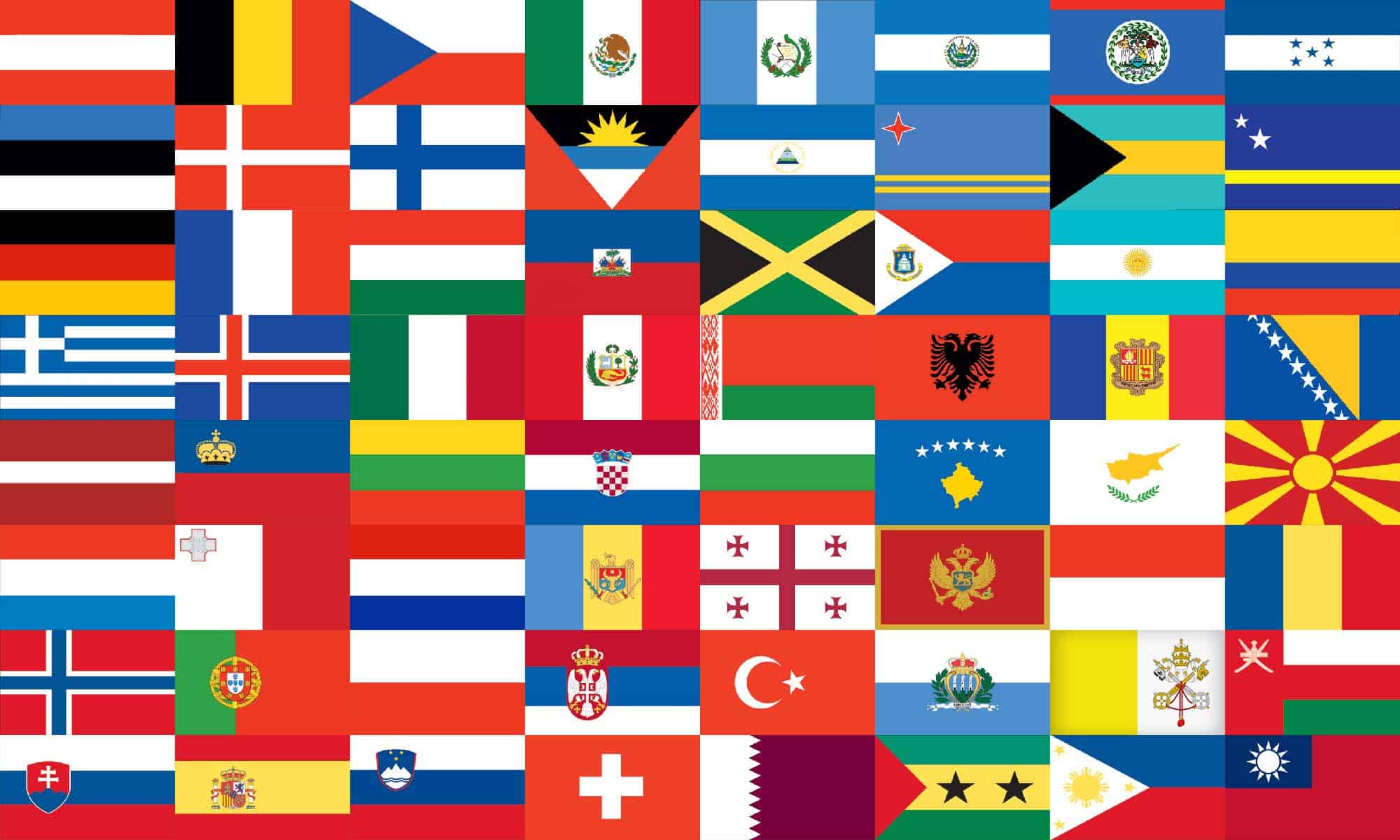
There are 27 countries you can visit with a Schengen visa. But, there are also 53 non-Schengen countries and territories that you can travel VISA-FREE with a Schengen visa.
Most people think that a Schengen visa is only for the Schengen zone. Yes, of course, it is. But many non-Schengen countries also honor Schengen visa as their own visa.
Table of Contents
IMPORTANT DISCLAIMER Visa requirements change constantly but we make every effort to keep the information accurate and up to date. We provide links to official sources wherever necessary, so you can conduct your own due diligence to verify the visa requirements before planning your trip. We shall not be held liable for any damages incurred as a result of using the information in this article. Refer to our full disclaimer for more information.
Why do non-Schengen countries honor Schengen visa?
There are several reasons why non-Schengen countries honor Schengen visas –
Reason 1: Countries soon to be included in the Schengen agreement
Countries that are in the process of joining the Schengen zone have already started honoring Schengen visas. Currently, Bulgaria, Romania and Cyprus are in the process of joining the Schengen zone
Reason 2: Countries trust the Schengen visa screening process
Schengen visa applicants are screened thoroughly for their strong ties with their home countries. Countries simply trust the Schengen visa application screening.
Reason 3: Countries that lack infrastructure, technology or resources
Countries may not have the required infrastructure, technology or resources to screen applicants as thoroughly as a Schengen visa.

BONUS: FREE eBOOK
Enter your name and email to download the FREE eBOOK: The Secret to VISA-FREE Travel
Opt in to receive my monthly visa updates
You can unsubscribe anytime. For more details, review our Privacy Policy.
Your FREE eBook is on it’s way to your inbox! Check your email.
What countries are included in the Schengen visa?
The following 27 countries are included in the Schengen visa.
- Czech Republic
- Liechtenstein
- Netherlands
- Switzerland
Apart from the above 27, there are about 53 non-Schengen countries and territories you can visit with a Schengen visa.
What Schengen visas are eligible for non-Schengen countries?
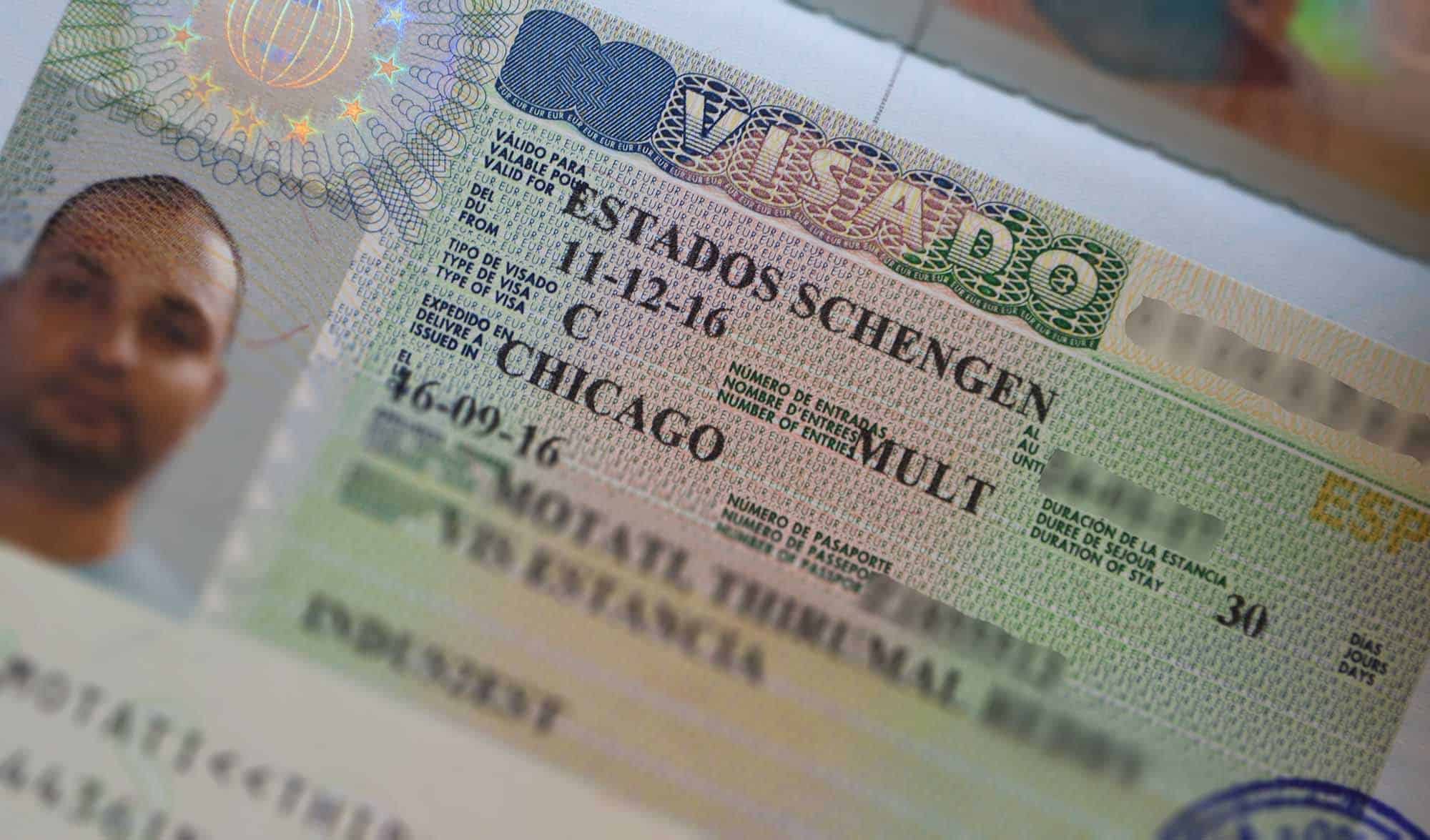
Depending on the country, any of the below Schengen visas can be used.
- Short-term C-Type Schengen visa (tourism/business)
- Long-term D-Type Schengen visa (study/work)
- Transit A-Type Schengen visa (transit)
- Residence permit from any Schengen country
Refer to each country below for permitted Schengen visa types. Some countries require the Schengen visa to be multiple-entry and have been used at least once to travel to the Schengen area.
So, without further ado, let’s get started.
North America

- Eligible nationalities: All nationalities
- Permitted visas: All valid used/unused multiple-entry Schengen visas
- Permitted residence permits: A valid permanent residence permit from any Schengen country
- Entry granted: Up to 180 days
- Entry rule: Schengen visa must be valid for the entire stay in Mexico
- Official source: National Institute of Migration, Mexico
RELATED: 53 countries you can travel VISA-FREE with a US visa in 2024
Central America

- Permitted residence permits: None
- Entry granted: 30 days
- Official source: Belize.com
03. Costa Rica
- Permitted visas: All valid used/unused multiple-entry D-Type Schengen visas (student and work only)
- Schengen C-Type short-stay visas are NOT accepted
- Schengen D-Type visa or residence permit must be valid for at least 3 months from the day of arrival
- Residence permit must be in the form of a “card”, residence permits in the form of visa stickers are not accepted
- Official source: Embassy of Costa Rica in Washington DC, US
04. El Salvador
- Burkina Faso
- Central African Republic
- Côte d’Ivoire
- Equatorial Guinea
- Guinea-Bissau
- Papua New Guinea
- Philippines
- Turkmenistan
- Entry granted: 90 days total in the entire CA-4 zone (Guatemala, Honduras, El Salvador and Nicaragua)
- If entering by air, a fee of 12 USD will be charged for a tourist card
- If you have already entered Guatemala or Honduras, you can enter El Salvador from Guatemala or Honduras by land without any additional visa requirements as per CA-4 Border Control Agreement
- Official source: IATA Travel Centre
05. Guatemala
- Côte d´Ivoire
- Dominican Republic
- If you have already entered Honduras or El Salvador, you can enter Guatemala from Honduras or El Salvador by land without any additional visa requirements as per CA-4 Border Control Agreement.
- Official source: Ministry of Foreign Affairs of Guatemala
06. Honduras
- Cote d’Ivoire
- South Sudan
- Schengen visa must be valid for at least 6 months from the day of arrival
- If you have already entered Guatemala or El Salvador, you can enter Honduras from Guatemala or El Salvador by land without any additional visa requirements as per CA-4 Border Control Agreement.
07. Nicaragua
- Afghanistan
- Bosnia and Herzegovina
- Congo, Dem Rep of
- Congo, Rep of
- Sierra Leone
- Timor-Leste
- Visa is NOT EXEMPT, but are eligible to obtain Visa ON ARRIVAL
- VOA fee is 50 USD, payable in USD, valid for 30 days, single-entry only
- Besides the VOA fee, there is a 10 USD entry fee, a 2 USD land border migration fee (for land border only) and 1 USD municipality tax (for land border only) (payable in USD only)
- Permitted visas: All valid USED multiple-entry Schengen visas, except those issued by non-EU countries (Iceland, Norway, Switzerland, Liechtenstein)
- Permitted residence permits: A valid residence permit from any Schengen country, except issued by non-EU countries (Iceland, Norway, Switzerland, Liechtenstein)
- Schengen visa must have been used at least once to enter the visa-issuing country
- Must show proof of economic solvency for a minimum of 500 USD
- Official source: Embassy of Panama in the USA
RELATED: 38 countries you can travel VISA-FREE with Canada visa in 2024

09. Antigua and Barbuda
- Permitted residence permits: A valid residence permit from any Schengen country
- VOA fee is 100 USD, valid for 30 days, single-entry only
- Official source: Department of Immigration, Antigua and Barbuda
- Official source: Netherlands Worldwide
11. Bahamas
- Entry granted: 90 days
- Official source: Ministry of Foreign Affairs of the Bahamas
12. Bonaire (Dutch Territory)
- Permitted visas: All valid used/unused multiple-entry Schengen visas (C-Type and D-Type only)
13. Curaçao
14. dominican republic.
- Permitted visas: All valid used/unused multiple-entry Schengen visas, except transit (A-Type)
- Entry rule: If arriving by land or sea, must pay a departure tax of 20 USD before departing. If arriving by air, the departure tax is included in the airfare.
- Official source: Ministry of Tourism of Dominican Republic
- Entry rule: A tourist fee of 10 USD must be paid on arrival at the airport
16. Jamaica
- Permitted visas: All valid used/unused single/multiple-entry Schengen visas
- Official source: Immigration Department of Jamaica
17. Sint Maarten
- Permitted visas: All valid used/unused multiple-entry Schengen visas (C-Type or D-Type only)
RELATED: 43 countries you can travel VISA-FREE with UK visa in 2024
South America

18. Colombia
- Permitted visas: All valid used/unused single/multiple-entry Schengen visas, except transit (A-Type)
- Entry rule: Schengen visa must be valid for at least 180 days from the day of arrival
- Official source: Ministry of Foreign Affairs of Colombia
- Entry granted: 180 days
- Entry rule: Schengen visa must be valid for at least 6 months from the day of arrival
- Official source: Ministry of Foreign Affairs of Peru
RELATED: 18 countries you can visit VISA-FREE with an Australian visa or PR in 2024

20. Albania
- Permitted visas: All valid used multiple-entry Schengen visas
- Entry rule: Schengen visa must have been used to enter the visa-issuing country
- Official source: Ministry of Foreign Affairs of Albania
21. Andorra
- Permitted visas: All valid USED double/multiple-entry Schengen visas (C-Type or D-Type only)
- Andorra doesn’t require any visa, but entry/exit to Andorra is only through Spain or France which requires a Schengen visa
- Schengen visa must be multiple-entry or at least double-entry as the entry/exit to Andorra is only through the Schengen zone
- Official source: Ministry of Foreign Affairs of Andorra
22. Armenia
- Marshall Islands
- Saint Kitts and Nevis
- Saint Lucia
- Saudi Arabia
- Solomon Islands
- Trinidad and Tobago
- Entry granted: 21 or 120 days
- VOA fee is 3,000 AMD, valid for 21 days, single-entry (OR) 15,000 AMD, valid for 120 days, single-entry
- Official source: Ministry of Foreign Affairs of Armenia
23. Belarus
- South Africa
- Permitted visas: All valid used multiple-entry Schengen visas (C-Type or D-Type only)
- Schengen visa must have been used to enter the visa-issuing country
- Must arrive and depart from the following airports only – Minsk National Airport, Airport Brest, Airport Gomel, Airport Grodno, Airport Mogilev and Airport Vitebsk.
- Official source: Ministry of Foreign Affairs of the Republic of Belarus
24. Bosnia and Herzegovina
- Eligible nationalities: All nationalities, except Kosovo
- Entry rule: Schengen visa must be valid for at least 30 days from the day of arrival
- Official source: Ministry of Foreign Affairs of Bosnia and Herzegovina
25. Bulgaria
- Permitted visas: All valid used multiple-entry Schengen visas, except transit (A-type)
- Entry rule: Total duration of consecutive stays must not exceed 90 days in any 180-day period
- Official source: Ministry of Foreign Affairs of Bulgaria
- Eligible nationalities: All nationalities, except Azerbaijan and Turkey
- Permitted visas: All valid used/unused double/multiple-entry Schengen visas (C-Type and D-Type only)
- Official source: Ministry of Foreign Affairs of Cyprus
27. Georgia
- Schengen visa must be valid on the day of arrival in Georgia
- Total duration of consecutive stays must not exceed 90 days in any 180-day period
- Official source: Ministry of Foreign Affairs of Georgia
28. Gibraltar (British Territory)
- Permitted visas: All valid USED multiple-entry Schengen visas
- Entry granted: 21 days
- Entry rule: Schengen visa must be valid for at least 7 days beyond the period of stay
- Official source: Gibraltar Borders & Coastguards Agency
- Permitted residence permits: A valid biometric residence permit from any Schengen country
- Entry granted: 15 days
- Entry rule: The residence permit from Schengen must be biometric
- Official source: Ministry of Foreign Affairs of Kosovo
30. Moldova
- São Tomé and Príncipe
- Entry rule: Schengen Visa or residence permit must be valid for the intended period of stay
- Official source: Ministry of Foreign Affairs of the Republic of Moldova
- Permitted visas: All valid USED double/multiple-entry Schengen visas
- Monaco doesn’t require any visa, but entry/exit to Monaco is only through France which requires a Schengen visa
- Schengen visa must be multiple-entry or at least double-entry as the entry/exit to Monaco is only through the Schengen zone
- Official source: Government of Principality of Monaco
32. Montenegro
- Entry rules: Schengen visa must be valid for the intended period of the stay
- Official source: Government of Montenegro
33. North Macedonia
- Permitted visas: All valid used/unused multiple-entry Schengen visas (C-Type only)
- Permitted residence permits: A valid temporary/permanent residence permit from any Schengen country
- Schengen visa must be valid for at least 5 days beyond the intended period of stay
- Total duration of consecutive stays must not exceed 3 months in any 6 months period
- Official source: Ministry of Foreign Affairs of Macedonia
34. Romania
- Permitted visas: All valid used double/multiple-entry Schengen visas (C-Type or LTV)
- The Schengen visa entries or length of stay must not have been exhausted
- The residence permit should have been granted for 5 or more years
- Official source: Ministry of Foreign Affairs of Romania
35. San Marino
- Permitted visas: All valid USED double/multiple-entry Schengen visas (C-Type or D-Type)
- Entry rule: San Marino has no border controls, but entry/exit to San Marino is only through Italy which requires a Schengen visa
- Official source: Ministry of Foreign Affairs of San Marino
- Schengen visa must be valid for the entire duration of the stay
- Official source: Ministry of Foreign Affairs of Serbia
- Algeria (those aged 15-18 and 35-65)
- North Korea
- Visa is NOT EXEMPT, but are eligible to apply for Turkey e-Visa online
- E-Visa fee is 43 USD, validity is 180 days, and single-entry only
- Official source: Ministry of Foreign Affairs of Turkey
If you hold a Schengen visa, follow this step-by-step guide to apply for Tukey e-Visa . This article will guide you to fill out your e-Visa application, pay the fee and download the approved e-Visa.
38. United Kingdom
- Permitted visas: All valid used/unused multiple-entry Schengen D-Type visas only (Short stay C-Type visas are not eligible)
- Entry granted: 24 hours only (Transit Without Visa)
- Visa is NOT EXEMPT, but are eligible to request a 24-hour entry at London (LHR) or Manchester (MAN) airports
- Must be traveling to or from the visa-issuing Schengen country only
- Must arrive and depart by air only
- Must hold the boarding pass for the onward flight
- Onward flight must be within 24 hours (on the same day or the next day before midnight)
- Granting the 24-hour entry is at the sole discretion of the immigration officer
39. Vatican City
- Entry granted: 1 day (there are no accommodation facilities for tourists in Vatican City)
- Entry rule: Vatican City doesn’t require any visa, but entry/exit to Vatican City is only through Italy which requires a Schengen Visa
RELATED: 13 VISA-FREE Countries You Can Visit with New Zealand Visa or PR in 2024
Middle East

40. Bahrain
- Entry granted: 14 days or 30 days
- Visa is NOT EXEMPT, but are eligible to obtain Visa ON ARRIVAL or Bahrain eVisa
- Single-entry VOA fee is 5 BD, valid for 14 days, entry up to 14 days
- Multiple-entry VOA fee is 12 BD, valid for 3 months, entry up to 1 month
- Single-entry eVisa fee is 9 BD, valid for 14 days, entry up to 14 days
- Multiple-entry eVisa fee is 16 BD, valid for 1 month, entry up to 14 days
- For VOA, the Schengen visa must be valid for the entire stay in Bahrain
- For eVisa, the Schengen visa must be valid for at least 6 months from the day of arrival
- Official source: Bahrain eVisa Portal
- Congo, Dem. Rep. Of
- Congo, Rep. of
- Guinea Bissau
- Permitted residence permits: A valid residence permit from any Schengen country, except Iceland, Norway, Switzerland and Liechtenstein.
- Visa is NOT EXEMPT, but are eligible to apply for Jordan e-Visa
- The residence permit must be valid for at least 6 months from the day of arrival
- Official source: Jordan E-Visa Portal
- El Salvador
- Entry granted: 10 or 30 days
- Visa is NOT EXEMPT, but are eligible to obtain Oman 26M or 26N Tourist Visa online
- 26M eVIsa fee is 20 OMR, valid for 30 days, single-entry only
- 26N eVIsa fee is 5 OMR, valid for 10 days, single-entry only
- Official source: Sultanate of Oman, Royal Oman Police
- Visa is NOT EXEMPT, but are eligible to apply for A3 Visa online on the Hayya portal
- A3 Visa fee is QAR 100, valid for 30 days, single-entry only
- Must provide hotel booking for the entire stay reserved through the Discover Qatar website
- Schengen visa or residence permit must be valid on the day of the A3 Visa application
- Official source: Qatar Tourist Board
44. Saudi Arabia
- Permitted visas: All valid used multiple-entry Schengen visas (C-Type and D-Type only)
- Permitted residence permits: A valid residence permit from any Schengen country, except Iceland, Norway, Switzerland and Liechtenstein
- Visa is NOT EXEMPT, but are eligible to obtain Visa ON ARRIVAL or Saudi Arabia eVisa
- VOA or eVisa fee is 300 SAR, valid for 1 year, multiple-entry (plus service fee and insurance fee)
- Schengen visa must have been USED to enter the visa-issuing country
- Official source: Saudi Arabia Tourism Authority
45. United Arab Emirates
- Permitted visas: None
- Entry granted: 14 days
- Visa is NOT EXEMPT, but are eligible to obtain Visa ON ARRIVAL at UAE airports
- VOA fee is 100 AED, valid for 14 days, single-entry only
- Schengen residence permit must be valid for at least 6 months from the day of arrival
- Official source: UAE Government Portal
RELATED: 5 ways to get proof of onward travel for your next trip

- Visa is NOT EXEMPT, but are eligible to obtain Visa ON ARRIVAL at all international airports
- VOA fee is 25 USD, valid for 30 days, single-entry only
- Official source: Egypt Tourism Department
47. Morocco
- Visa is NOT EXEMPT, but are eligible to apply for Morocco e-Visa
- E-Visa fee is 770 MAD, valid for 180 days, single-entry only
- Schengen visa must be valid for at least 90 days from the day of arrival
- Official source: Morocco E-Visa Portal
RELATED: How to turn your weak passport into a strong passport (with examples)

48. Kyrgyzstan
- Permitted visas: All valid used/unused LONG-TERM multiple-entry Schengen visas issued for at least 3+ years
- Entry granted: 7 days
- Schengen visa must be a long-term visa issued for 3 or more years. Schengen visas issued for less than 3 years are not accepted.
- After entering Kyrgyzstan this way, you can only reenter Kyrgyzstan again after 21 days.
- Official source: Ministry of Foreign Affairs of Kyrgyzstan
49. Philippines
- Passport must be valid for at least 6 months beyond the date of departure
- Official source: Embassy of the Philippines in India
50. Singapore
- Permitted visas: All valid used/unused single/multiple-entry Schengen visas that allow entry into Germany and Switzerland, except transit (A-Type)
- Permitted residence permits: A valid residence permit from Germany or Switzerland
- Entry granted: 96 hours (4 days)
- Visa is NOT EXEMPT but are eligible to obtain Visa Free Transit Facility (VFTF) upon arrival
- Must be traveling to or from the country of passport. Example: Must be traveling to a third country from India via Singapore or traveling to India from a third country via Singapore. An example itinerary would be India-Singapore-Bali or Bali-Singapore-India.
- Both arriving and departing flights in Singapore must be on the same itinerary
- The visa or residence permit must be valid for at least 1 month at the time of arrival
- Official source: Singapore Immigration & Checkpoints Authority
51. South Korea
- Eligible nationalities: All nationalities (except the following 23 nationalities – Afghanistan, Bangladesh, Cameron, Cuba, Egypt, Gambia, Ghana, Iran, Iraq, Kosovo, Kyrgyzstan, Myanmar, Nepal, Nigeria, Pakistan, Palestine, Senegal, Somalia, Sri Lanka, Sudan, Syria, Uzbekistan and Yemen)
- Entry rule: Must be traveling to/from the visa-issuing country through South Korea
- Official source: South Korea Embassy in Washington DC, USA
- Permitted visas: All valid/expired used/unused single/multiple-entry Schengen visas, except transit (A-Type)
- Permitted residence permits: A valid/expired residence permit from any Schengen country
- Visa is EXEMPT but must apply for ROC Travel Authorization Certificate online before arrival
- ROC Travel Authorization Certificate is free of charge, valid for 90 days, multiple-entry
- If using an EXPIRED Schengen visa or residence permit, the visa or residence permit must have expired in the last 10 years only
- Official source: Bureau of Consular Affairs, Republic of China (Taiwan)
53. Thailand
- Permitted visas: A RESIDENCE visa from any Schengen country, such as student, work, etc.
- Permitted residence permits: A valid residence permit from any Schengen countries
- Entry granted: 60 days
- Visa is NOT EXEMPT, but are eligible to apply for Thailand e-Visa online
- E-Visa fee is 40 USD, valid for 90 days or 180 days, single or multiple-entry
- Must submit proof of residence in the country of application such as driver’s license, utility bill, etc.
- Official source: Thai E-Visa Portal
RELATED: How to book flight tickets with 24 hour FREE cancellation on Expedia – A step-by-step guide
There you have it! 53 non-Schengen countries and territories you can travel VISA-FREE with a Schengen visa. Including the 27 Schengen countries, you can visit 80 countries and territories with a Schengen visa.
Do you know any other country (I haven’t listed here) where you can travel VISA-FREE with a Schengen visa? Let me know in the comments below.
Change history: For those who are interested, here are the changes to this list.
WRITTEN BY THIRUMAL MOTATI

Thirumal Motati is an expert in tourist visa matters. He has been traveling the world on tourist visas for more than a decade. With his expertise, he has obtained several tourist visas, including the most strenuous ones such as the US, UK, Canada, and Schengen, some of which were granted multiple times. He has also set foot inside US consulates on numerous occasions. Mr. Motati has uncovered the secrets to successful visa applications. His guidance has enabled countless individuals to obtain their visas and fulfill their travel dreams. His statements have been mentioned in publications like Yahoo, BBC, The Hindu, and Travel Zoo.
PLAN YOUR TRAVEL WITH VISA TRAVELER
I highly recommend using these websites to plan your trip. I use these websites myself to apply for my visas, book my flights and hotels and purchase my travel insurance.
01. Apply for your visa
Get a verifiable flight itinerary for your visa application from DummyTicket247 . DummyTicket247 is a flight search engine to search and book flight itineraries for visas instantly. These flight itineraries are guaranteed to be valid for 2 weeks and work for all visa applications.
02. Book your fight
Find the cheapest flight tickets using Skyscanner . Skyscanner includes all budget airlines and you are guaranteed to find the cheapest flight to your destination.
03. Book your hotel
Book your hotel from Booking.com . Booking.com has pretty much every hotel, hostel and guesthouse from every destination.
04. Get your onward ticket
If traveling on a one-way ticket, use BestOnwardTicket to get proof of onward ticket for just $12, valid for 48 hours.
05. Purchase your insurance
Purchase travel medical insurance for your trip from SafetyWing . Insurance from SafetyWing covers COVID-19 and also comes with a visa letter which you can use for your visas.
06. Get your zero-fee ATM card
You can manage money internationally in over 70 currencies using Wise . With a Wise card, you can store and withdraw cash in 40 currencies with zero ATM fees.
Need more? Check out my travel resources page for the best websites to plan your trip.
LEGAL DISCLAIMER We are not affiliated with immigration, embassies or governments of any country. The content in this article is for educational and general informational purposes only, and shall not be understood or construed as, visa, immigration or legal advice. Your use of information provided in this article is solely at your own risk and you expressly agree not to rely upon any information contained in this article as a substitute for professional visa or immigration advice. Under no circumstance shall be held liable or responsible for any errors or omissions in this article or for any damage you may suffer in respect to any actions taken or not taken based on any or all of the information in this article. Please refer to our full disclaimer for further information.
AFFILIATE DISCLOSURE This post may contain affiliate links, which means we may receive a commission, at no extra cost to you, if you make a purchase through a link. Please refer to our full disclosure for further information.
RELATED POSTS
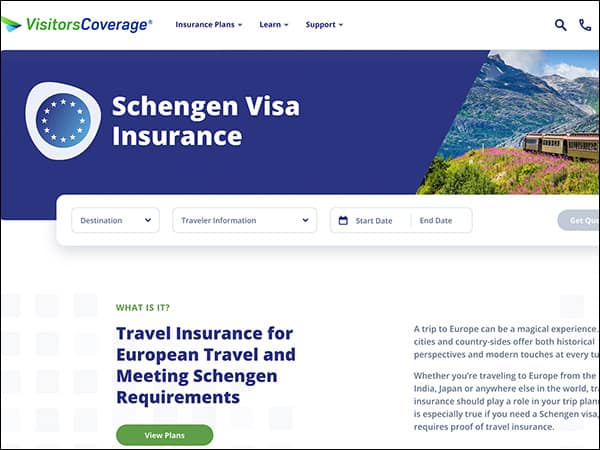
Loading 103 Comments... Please Wait.
- Cookie Policy
- Copyright Notice
- Privacy Policy
- Terms of Use
- Flight Itinerary
- Hotel Reservation
- Travel Insurance
- Onward Ticket
- Testimonials
Search this site
Travelling within the Schengen Area with a residence permit or visa
You want to travel within the Schengen Area. Find out which countries belong to the Schengen Area and with which document you are allowed to travel within it. Also find out how long you are allowed to travel within the Schengen Area with that document.
Schengen countries
Documents required to travel within the schengen area, the netherlands is part of the schengen area. the schengen area consists of different european countries. there are no border controls within the schengen area. the schengen area consists of the following countries:.
- Czech Republic
- Denmark (without the Faeroes and Greenland)
- France (without French Guyana, Guadeloupe, Martinique, Réunion)
- Liechtenstein
- Netherlands
- Norway (without Spitsbergen)
- Portugal (including the Azores and Madeira)
- Spain (including the Balearic and Canary Islands)
- Switzerland
Bulgaria, Cyprus, Ireland and Romania are not Schengen countries.
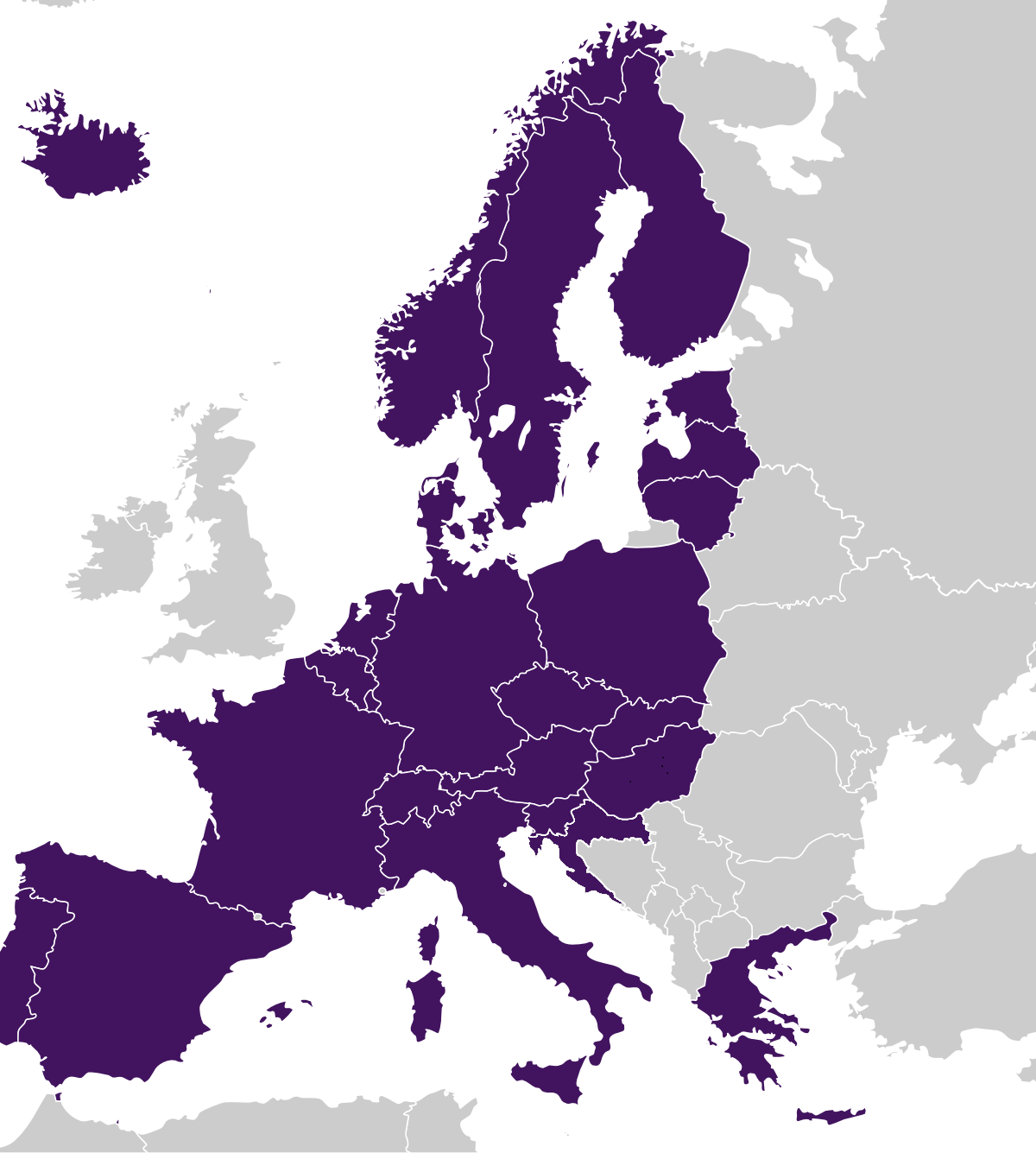
Do you want to travel within the Schengen Area? Then you need specific documents. Find out with which document you are allowed to travel within the Schengen Area and how long you are allowed to travel with that document.
Passport or other travel document always required.
You always need a passport or other travel document for a journey abroad. This is also the case for a journey within the Schengen Area. Your passport or travel document must not have been issued more than 10 years ago. The passport or other travel document must also be valid for at least another 3 months after you leave the Schengen Area.
Travellers with the nationality of a Schengen country
Travellers with the nationality of a Schengen country are free to travel to all countries in the Schengen Area. They do not need any extra document besides their passport or other travel document.
Travellers with residence permits
What if you do not have the nationality of a Schengen country but do have a valid Dutch residence permit? Then you are allowed to be in the Schengen Area for up to 90 days within a 180-day period. Besides your passport or other travel document, take your residence permit with you when you travel.
Travelling in the Netherlands after your residence permit has expired
Is your residence permit expiring and you will not continue to live in the Netherlands? But do you wish to stay in the Netherlands for an additional maximum of 90 days after the end of your permit? Read about a short stay after end of residence permit .
Travellers with a provisional residence permit (mvv)
Do you not have a residence permit, but you do have a valid provisional residence permit (in Dutch: machtiging tot voorlopig verblijf or MVV)? Then you are allowed to enter and exit the Netherlands and other countries in the Schengen Area. The MVV is a sticker in your passport.
Other travellers
You do not have the nationality of a Schengen country. Nor do you have a valid residence permit or valid provisional residence permit (MVV). In that case you sometimes need a visa to travel in the Schengen Area. This can be a single-entry visa or a multiple-entry visa.
No visa needed
Do you not need a visa? Then you are allowed to be in the Schengen Area in the visa-free period for up to 90 days within a 180-day period. In this period you are allowed to enter and exit the Schengen Area several times. You do not need an extra document besides your passport or other travel document.
Do you want to be in another Schengen country for a short stay? Then you do not have to first leave the Schengen Area. Do contact the authorities of the country you want to visit.
Single entry visa
You have a valid single-entry Schengen visa. You may enter the Schengen Area once with this visa. You may be in the Schengen Area for up to 90 days within a 180-day period. When you arrive in the Schengen Area, you must show that the Netherlands is your destination.
Multiple entry visa
You have a valid multiple-entry Schengen visa. You may enter and exit the Schengen Area several times with this visa. You may be in the Schengen Area for up to 90 days within a 180-day period. The first time you enter the Schengen Area you must show that the Netherlands is your destination.
- Travelling with a residence permit and return visa
- Apply for a Schengen visa

What is an EU Residence Permit?
An EU residence permit is an official document issued by a member state of the European Union that allows a non-EU national to live and work in any EU country for a specified period of time. The permit is also sometimes referred to as a “residence card” or “EEA residence permit”.
EU residence permits grant their holders the right to travel freely within the EU and also enjoy certain advantages in terms of healthcare, employment opportunities, and access to social security. The permit is usually valid for five years and comes with a few rights and privileges.
Who Is Eligible for an EU Residence Permit?
Any citizen of an EU country is automatically eligible for an EU residence permit. This includes citizens of countries that are not yet members of the EU. If you are not a citizen of an EU country, you may still be eligible for an EU residence permit if you have a valid passport and meet one of the following criteria:
- You are a family member of an EU citizen (spouse, child, parent, etc.)
- You have a valid work permit for an EU country
- You are a student enrolled at an accredited university in an EU country
- You have been granted asylum in an EU country
- You acquired a Golden Visa from an EU country
Application Process for an EU Residence Permit
To apply for an EU residence permit, you will need to submit an application form along with your passport and proof that you have been living in the EU for at least five years. The application process can take up to three months, depending on your country of residence. In some cases, you may also need to provide additional documents such as a birth certificate or marriage license.
Here’s a brief overview of the application process:
• Complete the residence permit application form and attach your passport and other required documents.
• Submit the application to the competent immigration authority in your EU country of residence.
• Wait for the decision from the immigration authority on whether you have been granted an EU residence permit.
Once you have received a positive decision, you receive a physical residence permit card that must be renewed every five years.
EU Residence Permit Requirements
To be eligible for an EU residence permit, you must:
- have legally lived in an EU country for at least five years
- have a valid passport or ID card
- be employed, self-employed, or have enough financial resources to support yourself
- have health insurance
- have no criminal record
If you are not a citizen of an EU country, you may still be eligible for a residence permit if you have a valid visa or another type of permit from an EU country. You will need to check with the embassy or consulate of the country where you want to reside to find out what specific requirements apply to you.
Residence Permit Validity
An EU residence permit is usually valid for five years, but this can vary depending on your country of origin and your personal circumstances. For example, if you are from a country that is considered high risk for immigration, your residence permit may only be valid for one year. You will need to renew your permit before it expires if you want to continue living in the EU.
Once you have held an EU residence permit for five years, you may be eligible to apply for permanent residency. This allows you to live and work in any EU country without having to renew your permit.
Who is considered an EU resident?
An EU resident is defined as a person who resides in the European Union for at least six months of the year. This includes citizens of EU countries, as well as those who have obtained a residence permit or similar document from an EU country.
What is the difference between an EU citizen and an EU resident?
An EU resident is someone who is currently living in the European Union and has obtained a residence permit from one of its member states. An EU citizen, on the other hand, is someone who holds a valid passport or ID card from an EU country and is automatically eligible for EU rights and privileges. This includes the right to travel, work, and study in any of the other EU countries.
What is the Difference Between a Visa and a Residence Permit?
Although both a requirement for entry and residence in the EU, a visa is a temporary document that allows you to stay in an EU country for up to 90 days. A residence permit, on the other hand, is an official document granting you longer-term residency rights in the EU. To obtain a residence permit, you must meet certain requirements such as having lived legally in an EU country for at least five years and having a valid passport or ID card.
How Do You Become a Resident of the EU?
To become a resident of the European Union, you must meet certain requirements and follow the application process for an EU residence permit. This includes submitting an application form with your passport and proof of residence, providing additional documents such as a birth certificate or marriage license, and following the guidelines laid out by your country of residence.
Once approved, you will receive an official document called a Residence Card which serves as your proof of residency in the EU. Once you have lived in an EU country for five years, you may be eligible to apply for citizenship. This allows you to live and work in any EU country without having to renew your permit.
What are the Benefits of Having an EU Resident Permit
Having an EU residence permit will provide you with certain benefits not available to those with only tourist or visitor visas. Here are some benefits of having an EU residence permit:
- Access to educational and vocational training
- Access to employment
- Access to core social protection and assistance
- Freedom of movement within the European Union
- Access to goods and services
Can I work in the EU with a residence permit?
Yes, you can work in the EU with a residence permit. In fact, one of the main benefits of EU residency is the right to live and work in any EU country. If you have a valid residence permit, you can apply for jobs in any EU country and travel freely within the Schengen Area.
You may need to obtain a work permit before beginning your job, depending on your nationality and the country where you will be working.
What is the Difference Between an EU Blue Card and a Residence Permit?
If you’re planning to move to Europe for work, you may be wondering about the difference between an EU blue card and a residence permit. While both document types allow foreign nationals to reside and work in European Union (EU) member states, there are some key distinctions between them.
An EU blue card is specifically designed for highly-skilled workers from outside of the European Economic Area (EEA). To qualify for an EU blue card, you must have a valid job offer or contract from an employer in an EU country with a salary that meets certain thresholds. Once you have your blue card, you can live and work in any other EU country for up to three months without applying for a new permit.
In contrast, a residence permit is a catch-all term that covers any type of permission to live in an EU country for a longer period of time. This includes permits for work, study, family reunification, and other purposes. Residence permits can be issued for varying lengths of time, from just a few months up to several years.
Where Can I travel with an EU Residence Permit?
With an EU residence permit, you can travel freely within the Schengen Area – Austria, Belgium, Bulgaria, Croatia, Republic of Cyprus, Czech Republic, Denmark, Estonia, Finland, France, Germany, Greece, Hungary, Ireland, Italy, Latvia, Lithuania, Luxembourg, Malta, Netherlands, Poland, Portugal, Romania, Slovakia, Slovenia, Spain, and Sweden. This also includes a few non-EU countries, such as Iceland, Lichtenstein, Norway, and Switzerland.
When traveling within the Schengen Area, you will not need to show your passport or residence permit at border control points. However, you may be asked to present other documents, such as your travel insurance policy or proof of sufficient funds for your stay. You should also be prepared to show your return ticket or onward journey itinerary if requested.
In conclusion, an EU residence permit is a document that allows you to live and work in any EU country. If you’re thinking about moving to Europe, it’s important to understand the process and requirements for obtaining an EU residence permit. This will ensure that you can make the most of your stay and take advantage of all the benefits that come with it. Good luck!

How Do I Become A Citizen Of The EU?
Europe is a vibrant, diverse continent with a population of 500 million people. Becoming an EU citizen is a great way to experience the culture,

2024 travel route itinerary ideas for Europe
We do not recommend that you try an fit all the sights and sounds of Europe into a single trip – there’s too much to

How to travel from Asia to Europe by land
An overland trip from Asia to Europe can either be the adventure of a lifetime or it can (quite literally) be as easy as walking
Privacy Overview

53 Non-EU Countries You Can Visit with a Schengen Visa (2024 Update for Visa-FREE Entry Worldwide)
by Aileen Adalid Visa Guides & Immigration 6 comments
- 20 Least Visited Countries in Europe: Off the Beaten Path Destinations
- Batanes Itinerary: Travel Guide to Batan, Sabtang & Itbayat Islands (5 Days or More)
- When in Kansai: CupNoodles Museum Osaka Ikeda (Travel Guide)
- Top 15 Common Travel Excuses That Should NOT Hold You Back!
- Top 5 Best Faroe Islands Restaurants: Where to Dine
- Top 10 Reasons to Explore India in The Maharajas Express Luxury Train
- How to Book a Flight Reservation for Visa Applications (a.k.a. Legitimate Dummy Ticket)
- Top 20 Instagram Spots in Cape Town, South Africa: Top Photography Locations
- Exploring Bohol Island: A Gem in Visayas, Philippines
- Best Hotels in Boracay, Philippines: From Cheap to Luxury Accommodations and Places to Stay
If you’re like me who holds a third world passport , you’re surely familiar with the fact that we can’t simply enter most countries with just our passports alone; there’s often a need for prior visa applications among many other arduous immigration processes that can cost a lot of money, time, and effort. (Countries You Can Visit with a Schengen Visa)
The good news though is that if we manage to get a Schengen visa , we can enter not only their 26 member European states — but ALSO enter 53 other countries ‘ visa-FREE ‘* around the world!
Curious to know more? Keep reading to find this list of countries you can visit with a Schengen visa in order to make the most of your global travels!
DISCLAIMER : I am NOT an embassy officer nor a migration agent. I am only here to provide you with the list of countries you can visit with a Schengen visa as based on my personal experiences, extensive research, and other readers’ contributions. If you ever need any help with visas or procedures, please check these visa guides or the related links I have provided in this article (or better yet, contact the appropriate government entities). . It also helps to note that I do not guarantee the timeliness of the information below. I do try my best to keep all information up to date BUT please make it your responsibility to recheck the facts since there could be more recent updates or changes. Thank you!
» Quick Travel Planning
- Find the best flights
- Global visa requirements
- Travel insurance (5% discount)
- Stay connected
– – –
Table of Contents
Schengen Area
As I’ve previously mentioned, the Schengen Area is a group of 26 countries and it comprises most of Europe . As part of a unified agreement, all of them have agreed to abolish passports and internal border controls.
This means that all the Schengen countries act as if they are only ‘one country’ — so every citizen of each member state is free to go anywhere they want. Meanwhile, outsiders who want to enter the Schengen Area would experience border control once at the first country that they enter; but after that, entering other member countries would no longer require further immigration control.
These 27 countries are namely:
- Austria (A)
- Belgium (B)
- Croatia (HR)
- Czech Republic (CZE)
- Denmark [1] (DK)
- Estonia (EST)
- Finland (FIN)
- France [2] (F)
- Germany (D)
- Greece (GR)
- Hungary (H)
- Iceland (IS)
- Latvia (LVA)
- Liechtenstein (LI)
- Lithuania (LT)
- Luxembourg (L)
- Netherlands [3] (NL)
- Norway [4] (N)
- Poland (PL)
- Portugal (P)
- Slovakia (SK)
- Slovenia (SVN)
- Spain [5] (E)
- Switzerland (CH)
[1] Excluding Greenland and the Faroe islands [2] Excluding overseas departments and territories [3] Excluding Aruba, Curaçao, Sint Maarten, and the Caribbean Netherlands [4] Excluding Svalbard [5] With special provisions for Ceuta and Melilla
From the above list, 4 of these are non-EU (or EFTA member states that may have border control) — Iceland, Liechtenstein, Norway, and Switzerland — whereas 22 are part of the EU.
However, to date, there are a total of 28 members of the EU; so what happened to the other 4? Well, Bulgaria, Cyprus, Ireland, and Romania — are just NOT part of the Schengen Area.
TRIVIA: There are 3 additional European microstates — Monaco, San Marino, and the Vatican — that can be considered as de facto within the Schengen Countries given how they don’t have border controls with the countries that surround them. However, it’s important to note that they are not official Schengen member states since they have not signed documents for it. (But of course, it’s fine to visit with a Schengen visa).
Looking for a Long-Term Travel Insurance?
Providing great coverage and flexibility without costing a fortune, SafetyWing is currently the preferred travel insurance of digital nomads! (Otherwise, HeyMondo provides more comprehensive coverage, albeit higher-priced but if you click this link , you can get a 5% discount!)
GET INSURED NOW !
Schengen Visa
The Schengen visa serves as the basic visa that you will need to be able to stay in all of the 26 countries.
Now, depending on the non-Schengen country stated in this list, you can use ANY of the following Schengen visa types in order to gain visa-free entry:
- Type A: for airport transits
- Single Entry (1) : you can only enter the Schengen area once
- Double Entry (2): you can only enter the Schengen area twice during the visa’s validity
- Multiple Entry: you can enter the Schengen area as many times as you want as long as you stay for only 90 days in ANY 180-day period
- Type D: long-term or long-stay visas (valid for more than 3 months, usually for study or work)
- Residence permit : from any Schengen country
*It helps to note that unless otherwise stated, most of the below 53 non-Schengen countries you can visit with a Schengen visa will ONLY grant visa-free entry for their territory if you have a Type C multiple entry Schengen visa. Some of them would even require that the Schengen visa has been used at least once prior to entry.
So please read thoroughly and do due diligence to make sure that you have the right document on hand!
RELATED READ: How to Stay Longer in Europe’s Schengen Area Legally
FAQ (Frequently Asked Questions)
If you have gone through a Schengen visa application, you would know how rigorous the process is; not to mention the number of documents that are required to prove your solvency and strong ties to your home country. Given this fact, a lot of countries trust this screening process and have come to acknowledge it as their own. Otherwise, other countries such as those found in Europe are in line to join Schengen so they are already accepting Schengen visas for entry into their borders.
If it only states a few letters like “CH”, it means that your Schengen visa only allows you to enter Switzerland (as based on the abbreviations above stated per Schengen member state). To access all of these 26 countries, your Schengen visa must state “Schengen States” or its equivalent phrase (e.g. ‘Etats Schengen, etc.’) .
Countries You Can Visit with a Schengen Visa

Sao Tome and Principe
Status: ACTIVE Valid For: All nationalities Visa Policy: Visa-FREE Entry Requirement: Any valid Schengen visa OR residence permit from any Schengen country Allowed Period of Stay: 15 days within 6 months Source : [ 1 ]
Status: ACTIVE Valid For: All nationalities Visa Policy: Visa on arrival (VOA) at the airport Entry Requirement: Any valid Schengen visa Allowed Period of Stay: Single-entry (30 days within 3 months) Other Entry Requirements: Visa fee of USD$25 (also accepts EUR and GBP in cash only) Source : [ 1 ]
» Asia & The Middle East «

Status: ACTIVE Valid For: Citizens of Republic of the Congo, Guinea, Israel, Mali, and Thailand Visa Policy: Can obtain an online eVisa Entry Requirement: Any valid Schengen visa, OR residence visa from any Schengen country that is valid at least 180 days on date of evisa application Allowed Period of Stay: 30 days Source : [ 1 ]
Status: ACTIVE Valid For: Citizens of Albania, Armenia, Azerbaijan, Belarus, Bhutan, Bosnia and Herzegovina, Costa Rica, Cuba, El Salvador, Georgia, Guatemala, Honduras, India, Kazakhstan, Kyrgyzstan, Laos, Maldives, Mexico, Nicaragua, Panama, Peru, Tajikistan, Turkmenistan, Uzbekistan, Vietnam Visa Policy: Can obtain an online eVisa Entry Requirement: Any valid Schengen visa Allowed Period of Stay: Single-entry (10 days for 5 OMR / 30 days for 20 OMR) or multiple-entry (1 year for 50 OMR with 30 days per visit) Source : [ 1 ]
Philippines
Status: ACTIVE Valid For: Citizens of China and India Visa Policy: Visa-FREE Entry Requirement: Any valid Schengen visa for Chinese / Any valid Schengen visa OR residence permit from any Schengen country for Indians Allowed Period of Stay: 7 days for Chinese / 14 days for Indians Source : [ 1 ]
Status: ACTIVE Valid For: All nationalities Visa Policy: Can obtain an ETA Entry Requirement: Any valid Schengen visa OR residence permit from any Schengen country Allowed Period of Stay: 30 days (can be extended for 30 additional days) Source : [ 1 ]
Saudi Arabia
Status: ACTIVE Valid For: All nationalities Visa Policy: Visa on arrival (VOA) at airports Entry Requirement: Any valid Schengen visa that has been used at least once (Type A or airport transit visa is not allowed) Allowed Period of Stay: 90 days for multiple-entry visa and 30 days for single-entry visa Other Entry Requirements: 480 SAR visa fee Source : [ 1 ]
Status: ACTIVE Valid For: Citizens of China and India Visa Policy: Visa-FREE Entry Requirement: Any valid Schengen visa or other visas issued by Germany or Switzerland (Type A or airport transit visa is not allowed) Allowed Period of Stay: 96 hours (4 days) Other Entry Requirements: Valid only if you are in transit to Singapore or arriving from any third country via Singapore (must show valid onward ticket departing Singapore within 96 hours) , OR if you have already used your Schengen visa (expired) you can still enter Singapore with it as long as you’re traveling directly from the country that issued the Schengen visa, en route through Singapore, and back to your home country Source : [ 1 ]
South Korea
Status: UNCERTAIN (As of 2022, only visas issued by Australia, Canada, NZ, and the US are acknowledged; I did not see Schengen visas on their list anymore) Valid For: All nationalities except citizens of Afghanistan, Bangladesh, Cameroon, Cuba, Egypt, Gambia, Ghana, Iran, Iraq, Kosovo, Kyrgyzstan, Myanmar, Nepal, Nigeria, North Macedonia, Pakistan, Palestine, Senegal, Somalia, Sri Lanka, Sudan, Syria, Uzbekistan, and Yemen Visa Policy: Visa-FREE Entry Requirement: Any valid Schengen visa (Type A or airport transit visa is not allowed) OR residence permit from any Schengen country Allowed Period of Stay: 30 days Other Entry Requirements: Valid only if you are directly arriving to South Korea from any of the Schengen countries (with onward ticket to a third country) OR arriving from a third country and then directly leaving South Korea onward to any Schengen country Source : [ 1 ]
Status: ACTIVE Valid For: Citizens of Cambodia, India, Indonesia, Laos, Myanmar, Vietnam Visa Policy: Visa-FREE provided that you apply for an ROC Travel Authorization Certificate online Entry Requirement: Any valid OR expired Schengen visa (Type A or airport transit visa is not allowed) OR residence permit from any Schengen country; however, the expired visa must not have expired for more than 10 years prior to the date of arrival in Taiwan Allowed Period of Stay: Multiple-entry but with a 14-day limit per entry during the 90-day visa validity Other Entry Requirements: If your work permit or visa is marked as “void”, “canceled” or “canceled without prejudice”, it is not accepted. You must also hold a return or onward ticket upon entry to Taiwan. Source : [ 1 ]
Status: ACTIVE Valid For: Citizens of Afghanistan, Algeria, Angola, Bangladesh, Benin, Botswana, Burkina Faso, Burundi, Cameroon, Cape Verde, Central African Republic, Chad, Comoros, Cote d’Ivoire, Congo, Dem. Rep, of, Congo, Rep. of, Djibouti, Egypt, Equatorial Guinea, Eritrea, Ethiopia, Gambia, Ghana, Guinea, Guinea-Bissau, India, Iraq, Kenya, Lesotho, Liberia, Libya, Madagascar, Malawi, Mali, Mauritania, Mozambique, Nepal, Niger, Nigeria, North Korea, Pakistan, Palestine, Philippines, Rwanda, Sao Tome and Principe, Senegal, Sierra Leone, Somalia, Sri Lanka, Sudan, Swaziland, Tanzania, Togo, Uganda, Vietnam, Yemen, and Zimbabwe Visa Policy: Eligible to apply for an eVisa online Entry Requirement: Any valid Schengen visa OR residence permit from any Schengen country Allowed Period of Stay: 30-day single-entry in a period of 180 days Other Entry Requirements: USD $43 visa fee Source : [ 1 ]

Status: ACTIVE Valid For: All nationalities Visa Policy: Visa-FREE Entry Requirement: A valid multiple-entry Schengen visa OR residence permit from any Schengen country Allowed Period of Stay: 90 days Source : [ 1 ]
Status: ACTIVE Valid For: All nationalities Visa Policy: Visa-FREE Entry Requirement: A valid multiple-entry Schengen visa OR residence permit from any Schengen country Allowed Period of Stay: 90 days Note: Given that entry and exit to Andorra can only be done through France or Spain, it is therefore required that you have a Schengen visa. Source : [ 1 ]
Status: ACTIVE Valid For: Citizens of Algeria, Bahrain, Belize, Bhutan, Bolivia, Brunei, Cambodia, Colombia, Costa Rica, Cuba, Egypt, El Salvador, Fiji, Grenada, Guatemala, Guyana, Haiti, Honduras, India, Indonesia, Iraq, Jamaica, Kiribati, Laos, Malaysia, Maldives, Marshall Islands, Micronesia, Mongolia, Morocco, Myanmar, Nauru, Nicaragua, Palau, Papua New Guinea, Paraguay, Philippines, Saint Kitts and Nevis, Saint Lucia, Samoa, Saudi Arabia, Solomon Islands, Suriname, Timor-Leste, Tonga, Trinidad and Tobago, Tunisia, Turkmenistan, Tuvalu, Vanuatu, Venezuela, and Vietnam Visa Policy: Visa on arrival (VOA) or eVisa advance application Entry Requirement: Any valid Schengen visa OR residence permit from any Schengen country Allowed Period of Stay: 21 or 120 days Note: USD $6 for 21 days or USD $30 for 120 days Source : [ 1 ]
Status: ACTIVE Valid For: Citizens of Egypt, Gambia, Haiti, India, Iran, Jordan, Lebanon, Namibia, Pakistan, Samoa, South Africa, and Vietnam Visa Policy: Visa on arrival (VOA) or eVisa advance application Entry Requirement: A used valid Type C or D multiple-entry Schengen visa Allowed Period of Stay: 30 days Other Entry Requirements: You must arrive and depart from airports located in Minsk, Brest, Vitebsk, Gomel, Grodno, and Mogile. Source : [ 1 ]
Bosnia and Herzegovina
Status: ACTIVE Valid For: All nationalities except Kosovo citizens Visa Policy: Visa-FREE Entry Requirement: A valid multiple-entry Schengen visa OR residence permit from any Schengen country Allowed Period of Stay: 30 days for every period of 180 days Other Entry Requirements: Your Schengen visa must be valid for at least 30 days from the date of your arrival Source : [ 1 ]
Status: ACTIVE Valid For: All nationalities Visa Policy: Visa-FREE Entry Requirement: A valid multiple-entry Schengen visa (Type A or airport transit visa is not allowed) Allowed Period of Stay: 90 days for any period of 180 days Source : [ 1 ]
Status: ACTIVE Valid For: All nationalities, except citizens of Azerbaijan and Turkey Visa Policy: Visa-FREE Entry Requirement: A valid double or multiple-entry Schengen visa (Type A or airport transit visa is not allowed) , OR residence permit from any EU country (except Ireland and the UK) Allowed Period of Stay: 90 days for any period of 180 days Note: Northern Cyprus (Turkish Republic of Northern Cyprus) which is different from the Republic of Cyprus (a member of the EU) , generally grants visa-free entry to most foreign citizens except for those from Armenia, Nigeria, and Syria. Source : [ 1 ]
Status: ACTIVE Valid For: All nationalities Visa Policy: Visa-FREE Entry Requirement: A valid Schengen visa (Type A or airport transit visa is not allowed) , OR residence permit from any Schengen country Allowed Period of Stay: 90 days for any period of 180 days Source : [ 1 ]
Gibraltar (British Overseas Territories)
Status: ACTIVE Valid For: Citizens of China, India, Mongolia, and Morocco Visa Policy: Visa-FREE Entry Requirement: A valid multiple-entry Schengen visa with at least 7 days of validity Allowed Period of Stay: 21 days Source : [ 1 ]
Status: ACTIVE Valid For: All nationalities Visa Policy: Visa-FREE Entry Requirement: A valid multiple-entry Schengen visa OR biometric residence permit from any Schengen country Allowed Period of Stay: 15 days in a period of 180 days Source : [ 1 ]
Status: ACTIVE Valid For: Citizens of Angola, Belize, Benin, Bhutan, Bolivia, Botswana, Myanmar, Burundi, Cambodia, Cape Verde, Central African Republic, China, Comoros, Djibouti, Dominican Republic, Equatorial Guinea, Ethiopia, Fiji, Gabon, Gambia, Guinea, Guinea-Bissau, Guyana, Haiti, India, Jamaica, Kenya, Kuwait, Laos, Lesotho, Madagascar, Malawi, Maldives, Mongolia, Mozambique, Namibia, Nauru, Nepal, Oman, Papua New Guinea, Philippines, Qatar, Rwanda, São Tomé and Príncipe, Saudi Arabia, Senegal, South Africa, Sri Lanka, Suriname, Swaziland, Tanzania, Thailand, Togo, Uganda, and Zambia Visa Policy: Visa-FREE Entry Requirement: A valid Type C or Type D Schengen visa (Type A or airport transit visa is not allowed) , OR residence permit from any Schengen country Allowed Period of Stay: 90 days Source : [ 1 ]
Status: ACTIVE Valid For: All nationalities Visa Policy: Visa-FREE Entry Requirement: A valid double or multiple-entry Schengen visa, OR residence permit from any Schengen country Allowed Period of Stay: 90 days Note : There’s actually no passport control in Monaco but given that entry and exit are only possible through France, a Schengen visa is required Source : [ 1 ]
Status: ACTIVE Valid For: All nationalities Visa Policy: Visa-FREE Entry Requirement: A valid Schengen visa, OR residence permit from any Schengen country Allowed Period of Stay: 30 days every 180-day period Other Entry Requirements : The Schengen visa must be valid during the intended period of stay in Montengero Source : [ 1 ]
North Macedonia
Status: ACTIVE Valid For: All nationalities Visa Policy: Visa-FREE Entry Requirement: A valid Type C multiple-entry Schengen visa, OR residence permit from any Schengen country Allowed Period of Stay: 15 days in which total duration of stay must not exceed 90 days in any 180-day period Other Entry Requirements : The Schengen visa must be valid for at least 5 (five) days beyond the intended period of stay in North Macedonia Source : [ 1 ]
Status: ACTIVE Valid For: All nationalities Visa Policy: Visa-FREE Entry Requirement: A valid Type C or Type D double/multiple-entry Schengen visa, OR residence permit from any Schengen country Allowed Period of Stay: 90 days for any period of 180 days Other Entry Requirements : Residence permit must have 5 years validity or more, and Schengen visas’ entries or length of stay must not have been exhausted Source : [ 1 ]
Status: ACTIVE Valid For: All nationalities Visa Policy: Visa-FREE Entry Requirement: A valid double or multiple-entry Schengen visa, OR residence permit from any Schengen country Allowed Period of Stay: 10 days, if you stay for more you need a permit from the government Note : There’s actually no passport control in San Marino but given that entry and exit are only possible through Italy, a Schengen visa is required Source : [ 1 ]
Status: ACTIVE Valid For: All nationalities Visa Policy: Visa-FREE Entry Requirement: Any valid double or multiple-entry Schengen visa, OR residence permit from any Schengen country Allowed Period of Stay: 90 days for any 180-day period Other Entry Requirements : The Schengen visa must be valid during the intended period of stay in Serbia Source : [ 1 ]
United Kingdom
Status: CANCELLED Valid For: All nationalities Visa Policy: 24-hour FREE transit ONLY at London’s Heathrow Airport Entry Requirement: Any valid Type D multiple-entry Schengen visa, OR residence permit from any Schengen country Allowed Period of Stay: 24 hours Other Entry Requirements : You must be transiting to or from a Schengen country by air, provided that the onward flight is within 24 hours Source : [ 1 ]
Vatican City
Status: ACTIVE Valid For: All nationalities Visa Policy: Visa-FREE Entry Requirement: A valid double or multiple-entry Schengen visa, OR residence permit from any Schengen country Note : There’s actually no passport control in the Vatican City but given that entry and exit are only possible through Italy, a Schengen visa is required Source : [ 1 ]
» North & Central America «

Status: ACTIVE Valid For: All nationalities Visa Policy: Visa-FREE Entry Requirement: A valid multiple-entry Schengen visa Allowed Period of Stay: 90 days Source : [ 1 ]
Status: CANCELLED Valid For: All nationalities Visa Policy: Visa-FREE entry Entry Requirement: Any valid Schengen visa Allowed Period of Stay: 30 days in any 180-day period Source : [ 1 ]
El Salvador
Status: ACTIVE Valid For: Citizens of Azerbaijan, Belarus, Benin, Bhutan, Bolivia, Burkina Faso, Burundi, Cambodia, Cape Verde, Central African Republic, Chad, China, Comoros, Cote d’Ivoire, Djibouti, Dominica, Egypt, Equatorial Guinea, Gabon, Gambia, Georgia, Grenada, Guinea, Guinea-Bissau, Guyana, India, Jamaica, Kazakhstan, Kiribati, Kyrgyzstan, Lesotho, Malawi, Maldives, Mauritania, Mauritius, Micronesia, Moldova, Montenegro, Morocco, Myanmar, Namibia, Nauru, Niger, Palau, Papua New Guinea, Philippines, Rwanda, Samoa, Senegal, Serbia, Seychelles, South Sudan, Suriname, Swaziland, Tajikistan, Tanzania, Thailand, Togo, Tonga, Tunisia, Turkmenistan, Uganda, Uzbekistan, and Zambia Visa Policy: Visa-FREE Entry Requirement: A valid multiple-entry Schengen visa, OR residence permit from any Schengen country Allowed Period of Stay: 90 days total in the entire CA-4 zone (Guatemala, Honduras, El Salvador, and Nicaragua) without leaving the CA-4 zone Note: A visa issued by one of the four CA-4 countries is honored by all of the other country members. So if for example, you have already visited Guatemala or Honduras, you can enter El Salvador from either of the aforementioned countries by land without any additional visa requirements Other Entry Requirements: All visitors must obtain a tourist card upon arrival (US$12) Source : [ 1 ]
Status: ACTIVE Valid For: Citizens of Azerbaijan, Belarus, Benin, Bhutan, Bolivia, Burkina Faso, Burundi, Cambodia, Cape Verde, Central African Republic, Chad, China, Comoros, Cote d’Ivoire, Djibouti, Dominica, Egypt, Equatorial Guinea, Gabon, Gambia, Georgia, Grenada, Guinea, Guinea-Bissau, Guyana, India, Jamaica, Kazakhstan, Kiribati, Kyrgyzstan, Lesotho, Malawi, Maldives, Mauritania, Mauritius, Micronesia, Moldova, Montenegro, Morocco, Myanmar, Namibia, Nauru, Niger, Palau, Papua New Guinea, Philippines, Rwanda, Samoa, Senegal, Serbia, Seychelles, South Sudan, Suriname, Swaziland, Tajikistan, Tanzania, Thailand, Togo, Tonga, Tunisia, Turkmenistan, Uganda, Uzbekistan, and Zambia Visa Policy: Visa-FREE Entry Requirement: A valid multiple-entry Schengen visa, OR residence permit from any Schengen country Allowed Period of Stay: 90 days total in the entire CA-4 zone (Guatemala, Honduras, El Salvador, and Nicaragua) without leaving the CA-4 zone Note: A visa issued by one of the four CA-4 countries is honored by all of the other country members. So if for example, you have already visited El Salvador or Honduras, you can enter Guatemala from either of the aforementioned countries by land without any additional visa requirements Source : [ 1 ]
Status: ACTIVE Valid For: Citizens of Azerbaijan, Belarus, Benin, Bhutan, Bolivia, Burkina Faso, Burundi, Cambodia, Cape Verde, Central African Republic, Chad, China, Comoros, Cote d’Ivoire, Djibouti, Dominica, Egypt, Equatorial Guinea, Gabon, Gambia, Georgia, Grenada, Guinea, Guinea-Bissau, Guyana, Hong Kong, India, Jamaica, Kazakhstan, Kiribati, Kyrgyzstan, Lesotho, Macau, Malawi, Maldives, Mauritania, Mauritius, Micronesia, Moldova, Montenegro, Morocco, Myanmar, Namibia, Nauru, Niger, Palau, Papua New Guinea, Philippines, Rwanda, Samoa, Senegal, Serbia, Seychelles, South Sudan, Suriname, Swaziland, Tajikistan, Tanzania, Thailand, Togo, Tonga, Tunisia, Turkmenistan, Uganda, Uzbekistan, Zambia, and Zimbabwe Visa Policy: Visa-FREE Entry Requirement: A valid multiple-entry Schengen visa, OR residence permit from any Schengen country Allowed Period of Stay: 90 days total in the entire CA-4 zone (Guatemala, Honduras, El Salvador, and Nicaragua) without leaving the CA-4 zone Note: A visa issued by one of the four CA-4 countries is honored by all of the other country members. So if for example, you have already visited El Salvador or Guatemala, you can enter Honduras from either of the aforementioned countries by land without any additional visa requirements Source : [ 1 ]
Status: ACTIVE Valid For: All nationationalities Visa Policy: Visa-FREE entry for business, tourism and transit purposes Entry Requirement: A valid Schengen visa, OR permanent residence permit from any Schengen country Allowed Period of Stay: 180 days Other Entry Requirements: A valid passport with more than 6 months of validity Source : [ 1 ]
Status: UNCERTAIN (especially after Brexit commenced) Valid For: All nationalities Visa Policy: Visa-FREE Entry Requirement: Any valid Schengen visa Allowed Period of Stay: 180 days Source : [ 1 ]
Status: ACTIVE Valid For: Citizens of Afghanistan, Albania, Armenia, Bangladesh, Bosnia and Herzegovina, Botswana, Cameroon, Congo, Dem Rep of, Congo, Rep of, Eritrea, Haiti, India, Iraq, Kenya, Laos, Liberia, Libya, Mali, Mongolia, Nepal, Nigeria, Pakistan, Sierra Leone, Somalia, Sri Lanka, Sudan, Syria, Timor-Leste, Yemen, and Vietnam Visa Policy: Visa-on-arrival (VOA) Entry Requirement: A valid multiple-entry Schengen visa Allowed Period of Stay: 90 days total in the entire CA-4 zone (Guatemala, Honduras, El Salvador, and Nicaragua) without leaving the CA-4 zone Other Entry Requirements: $50 VOA fee and $10 tourist card fee (if entering by land, $2 border migration fee and $1 municipality tax) Source : [ 1 ]
Status: ACTIVE Valid For: All nationationalities Visa Policy: Visa-FREE entry for business, tourism, and transit purposes Entry Requirement: A valid used multiple-entry Schengen visa, OR residence permit from any Schengen country (except those issued by non-EU countries such as Iceland, Norway, Switzerland, and Liechtenstein) Allowed Period of Stay: 30 days Other Entry Requirements: The multiple-entry visa must have six (6) months of remaining validity, you must have a valid passport with a minimum of 3 months validity, and proof of solvency (at least $500) Source : [ 1 ]
» South America «

Status: CANCELLED Valid For: All nationalities Visa Policy: Access to eVisa application Entry Requirement: A valid Schengen visa Allowed Period of Stay: 90 days Source : [ 1 ]
Status: ACTIVE Valid For: Citizens of Cambodia, China, India, Macao, Myanmar, Nicaragua, Thailand, and Vietnam Visa Policy: Visa-FREE entry Entry Requirement: A valid used Schengen visa (Type A or airport transit visa is not allowed) , OR residence permit from any Schengen country Allowed Period of Stay: 90 days Other Entry Requirements: The Schengen visa must be valid for at least 180 days from your arrival date Source : [ 1 ]
Status: ACTIVE Valid For: Citizens of China and India Visa Policy: Visa-FREE entry Entry Requirement: A valid Schengen visa with a minimum validity of more than 6 months, OR permanent residence permit from any Schengen country Allowed Period of Stay: 180 days Source : [ 1 ]
» The Carribean «

Antigua & Barbuda
Status: ACTIVE Valid For: All nationalities Visa Policy: Visa on arrival (VOA) Entry Requirement: A valid Schengen visa with a minimum validity of at least 6 months Allowed Period of Stay: 30 days Other Entry Requirements: $100 VOA fee Source : [ 1 ]
Status: ACTIVE Valid For: All nationalities Visa Policy: Visa-FREE entry Entry Requirement: A valid multiple-entry Schengen visa (Type C or D) , OR residence permit from any Schengen country Allowed Period of Stay: 30 days but no more than 180 days Source : [ 1 ]
Status: ACTIVE Valid For: Citizens of India Visa Policy: Visa on arrival (VOA) Entry Requirement: A valid multiple-entry Schengen visa, OR residence permit from any Schengen country Allowed Period of Stay: 90 days Source : [ 1 ]
Status: ACTIVE Valid For: All nationalities Visa Policy: Visa-FREE entry Entry Requirement: A valid multiple-entry Schengen visa (Type C or D) , OR residence permit from any Schengen country Allowed Period of Stay: 90 days Source : [ 1 ]
Status: ACTIVE Valid For: Citizens of Afghanistan, Bangladesh, Cameroon, Eritrea, Ethiopia, Ghana, Guinea, India1, Iran, Iraq, Nepal, Nigeria, Pakistan, Philippines, Sierra Leone, Somalia, Sri Lanka, Syria, Uzbekistan, and Yemen Visa Policy: Eligible to obtain a Tourist Card (Tarjeta del Turista) instead of a Cuban visa and it can be obtained from Cuban consulates, authorized airlines, online retailers, and travel agencies Entry Requirement: A valid Schengen visa (Type C or D) , OR residence permit from any Schengen country Allowed Period of Stay: 30 days Source : [ 1 ]
Status: ACTIVE Valid For: All nationalities Visa Policy: Visa-FREE entry Entry Requirement: A valid multiple-entry used Schengen visa (Type C or D) , OR residence permit from any Schengen country Allowed Period of Stay: 90 days Source : [ 1 ]
Status: INACTIVE (To date, most nationalities can just simply enter Dominica visa-FREE for either 6 months or 21 days) Valid For: All nationalities Visa Policy: Visa-FREE entry Entry Requirement: A valid Schengen visa, OR residence permit from any Schengen country Allowed Period of Stay: 90 days
Dominican Republic
Status: ACTIVE Valid For: All nationalities Visa Policy: Visa-FREE entry Entry Requirement: A valid multiple-entry Schengen visa (Type C or D) , OR residence permit from any Schengen country Allowed Period of Stay: 30 days Other Entry Requirements: If arriving by land or sea, you must buy a ‘Tourist Card’ on arrival for $20 (this cost is already included in your airfare if traveling by air) Source : [ 1 ]
Status: ACTIVE Valid For: Citizens of Colombia, Cuba, Dominican Republic, Iran, Libya, Palestine, Panama, Syria, Vietnam, and Yemen Visa Policy: Visa-FREE entry Entry Requirement: A valid Schengen visa Allowed Period of Stay: 90 days Other Entry Requirements: $10 tourist fee Source : [ 1 ]
Status: ACTIVE Valid For: Citizens of Belarus, Dominican Republic, Kazakhstan, and Moldova Visa Policy: Visa-FREE entry Entry Requirement: A valid Schengen visa Allowed Period of Stay: 30 days Other Entry Requirements: The Schengen visa must be valid for at least 30 days from the date of arrival Source : [ 1 ]
Sint Maarten
Status: ACTIVE Valid For: All nationalities Visa Policy: Visa-FREE entry Entry Requirement: A valid multiple-entry Schengen visa (Type C or D) , OR residence permit from any Schengen country Allowed Period of Stay: 30 days Source : [ 1 ]
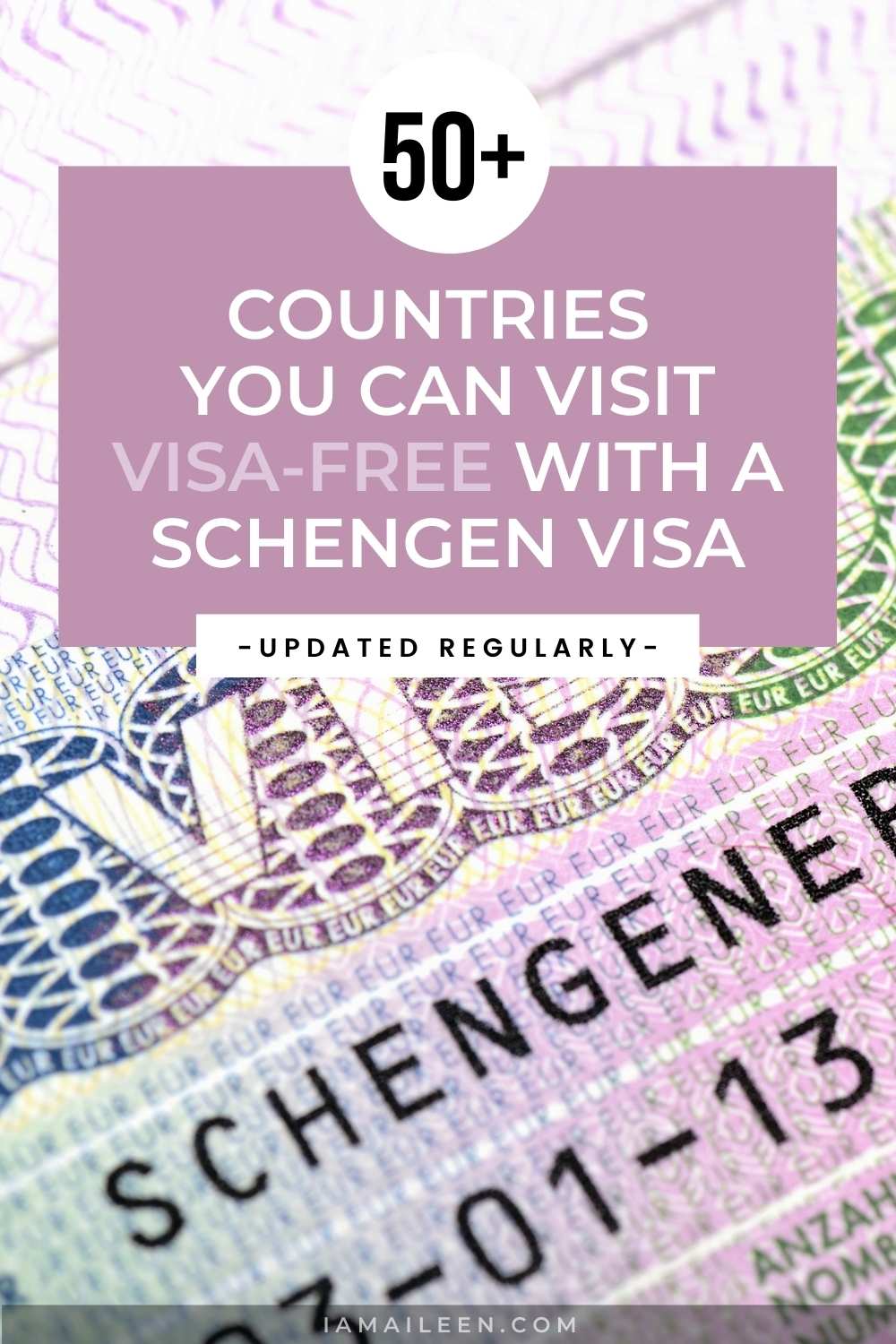
I hope this list of countries you can visit with a Schengen visa will help you make the most of your upcoming travels!
Let me know as well if I happened to have missed any updated info by leaving a comment in the section below.
Have you seen my latest vlog?

Hey there! I am Aileen Adalid. At 21, I quit my corporate job in the Philippines to pursue my dreams. Today, I am a successful digital nomad (online entrepreneur, travel writer, & vlogger) living a sustainable travel lifestyle.
My mission? To show you how it is absolutely possible to create a life of travel no matter the odds — and I will help you achieve that through my detailed travel hacks, guides, resources, tips, and MORE!
Follow Along
CURRENTLY BASED IN: The Philippines
- 100k Followers
- 51k Followers
- 80k Followers
- 10k Followers
- 23.1k Followers
Join over 1 million readers worldwide and get my FREE packing checklist, gain exclusive access to travel giveaways and more!

Success! Next, please check your email to confirm your subscription.
GET FREE PRINTABLE NOW!
Trending Now
Top 10 things to do on a trip to south america.
South America is one of the most diverse continents — full of natural wonders and fascinating cultures. Join us as we explore the top 10 things to do.
Top 10 Things to Do for Your First Tibet Travel
Make the most of your Tibet travel with these top 10 must-do activities, from exploring ancient monasteries to trekking mountains!
Geisha of Japan: Understanding the Facts, History & Myths
Japan’s geisha are cloaked in mystery & secrecy resulting in a number of false ideas about them — so let’s get the facts straight!
Maximizing Your Miles: Unlock Budget-Friendly Travel Hacks & Tips
Start traveling smart! Take note of these travel hacks that will help you in maximizing your miles or do points hacking.
EU261 Compensation: Your Essential Guide on European Flight Delays or Cancellations
Learn to claim EU261 compensation for flight disruptions like delays, cancellations, downgrades, or denied boarding!
Latest Posts
Learn Today
How to start a successful blog.
Thanks so much for this! As a Nigerian who recently obtained a TRC for Portugal, it’s been hard to find information on this kind of thing. I made it to Mexico with my Type D visa but there was contradictory information about whether I could go or not – I printed out the confirmation information from one of the Mexico embassies and took my chances.
I love traveling. I get so excited whenever I think about my next vacation but it’s hard to keep up with all the changes in customs and immigration regulations. This article is a great resource to help me plan my itinerary and figure out which countries I can visit with a Schengen visa!
I’ve been looking for this resource for a while now. I haven’t seen an article as comprehensive as this for countries I can visit visa free with a schengen tourist visa. Thank you!
Glad to be of help! :D
This is very helpful! Thank you!
I’m happy to hear!
Submit a Comment Cancel reply
Your email address will not be published. Required fields are marked *
Be notified of follow-up comments by email
Be notified of new posts by email
Submit Comment
Pin It on Pinterest
- fr français
- pt português
Already in the EU?

On these pages you can find general information on what rules apply if you are a non-EU citizen already in an EU country and would like:
- your family to join you
- to become a long-term resident
- to move to another EU country
- to know more on what the EU is doing to promote integration
While immigration rules vary from country to country, these pages explain the general conditions and procedures which you can expect to find in most EU countries.
Applications for family reunification or long-term resident status must always be made to the authorities of the EU country you are already living in.
This information applies in 25 of the 27 EU countries, excluding Denmark and Ireland.
Bringing your family together
Would you like your family to join you in the eu country where you are living.
If you are a citizen of a country outside the EU and you are legally resident in an EU country, you may be able to apply to have your family come and live with you. This is called family reunification. If you apply for family reunification, you are called a “sponsor”.
On these pages you will find general information on how to apply for family reunification within the EU and the rights that your close relatives may have once they are reunited with you.
For detailed information on the rules for family reunification in a particular country, select the country on this map .
If you are not an EU citizen but would like to join a member of your family who is an EU citizen, a different set of rules will apply to you and your relatives. Visit the Your Europe Portal for more information.
The following text explains the family reunification rules under EU law (the Family Reunification Directive). However, individual EU countries may have more favourable and more broadly applicable rules in place than what is laid down in the Directive. Therefore, you should always turn to national authorities to find out the details of policy and practice in the host country.
Who can apply for family reunification?
You can apply to have your family join you in the EU if you:
- hold a residence permit issued for a period of at least one year by an EU country, and
- have so called “reasonable prospects” of staying permanently in that country. “Reasonable prospects” are defined individually by each EU country.
In some EU countries you can only apply for your family to join you after you have been living there legally for two (or in some cases three) years. If you require more details on the rules in your EU host country, select the country on this map .
Which family members can join me?
The following family members can join you:
- Your husband or wife (including same-sex spouse, when same-sex marriage is recognised in the EU country where you reside). As polygamy is not recognised, you can only be joined by one spouse;
- The minor children of you and your spouse;
- When there are children from a previous relationship, the minor dependent children of you, or of your spouse, provided you/your spouse has custody, and in case of shared custody the other custodian has given consent.
‘Minor children’ are children who are not considered adults under the laws of the sponsor’s host EU country and who are unmarried. They include adopted children.
Depending on the EU country in which you live, some further restrictions may apply:
- You and your spouse may have to be of a certain minimum age (maximum 21 years old);
- More restrictive rules may apply to children over the age of 12 who arrive independently of their families.
Depending on the rules in your host EU country, the following family members may also be able to join you:
- Your unmarried partner;
- Your registered partner;
- Your parents or the parents of your spouse who are dependent and do not enjoy family support in the country of origin;
- Your adult unmarried children, or those of your spouse, who are unable to look after themselves due to the state of their health.
For detailed information on the family members that can join you in a particular EU country, select the country on this map .
Are there conditions to fulfil to have my family come live with me ?
Once you have proven that the applicants are your family members according to the applicable definitions, you may be required to fulfil certain material conditions. Namely, you may have to prove that you can provide, both for yourself and the family members:
- Adequate accommodation;
- Health insurance;
- Sufficient, regular and stable financial support.
Some EU countries may also require you and/or your family members to comply with integration measures such as tests for language or civic knowledge about the country you are moving to.
If you have a refugee status in the host country, your family members benefit from a more favourable scheme and are subject to fewer conditions.
For detailed information on the conditions set by a particular EU country, select the country on this map .
My family members have been allowed to join me. What happens next?
Your family members will be issued with residence permits allowing them to reside in your host country, valid for at least one year and renewable. As a rule, your family members’ residence permits cannot be valid beyond the expiry date of your own residence permit. Some countries issue residence permits abroad whereas in others family members may obtain the permits only after having entered the territory.
Do my family members need entry visas?
Your family members who have been granted family reunification may need entry visas, depending on their nationality and on whether the EU host country issues residence permits abroad. For information on how your family members can enter into your host country, select the country on this map .
Can a family member’s permit be refused or withdrawn?
Yes. In the following circumstances, a family member’s permit can be refused or withdrawn:
- Failure to fulfil the conditions for family reunification;
- End of family relationship;
- Use of false information or documents;
- Threat to public security, public policy or public health.
Can I argue against a decision to refuse a family reunification application or to refuse or withdraw a relative’s residence permit?
Yes. You will have the right to legally challenge a decision to refuse your application for family reunification or a decision to refuse or withdraw a residence permit for your family member.
What entitlements do my family members have?
Your family members will be entitled, in the same way as you, to the following:
- Access to employment / self-employment (this may be limited for a maximum of one year);
- Access to education;
- Access to vocational training.
Can my family members eventually qualify for residence permits in their own right?
Yes. Your spouse, unmarried partner and children who have reached adulthood will be allowed to get a residence permit in their own right after no less than five years. Access to personal residence permit may be limited if the family relationship has broken down. For other relatives, different rules apply depending on the EU host country concerned.
Family members may be issued with a personal permit before five years where:
- Their sponsor has died;
- They are separated or divorced from their sponsor;
- They are faced with ‘particularly difficult circumstances’ such as domestic violence.
For detailed information on how to qualify for an autonomous residence permit in a particular EU country, select the country on this map .
Long-term residents
If you have stayed legally in an eu country for five years, you may be entitled to be given a "long-term resident" status there..
What is a long-term resident?
A long-term resident is a citizen from a country outside the EU who has been given long-term resident status. This status means that the person will have similar rights as EU citizens.
What conditions must I fulfil to get long-term resident status?
If you have resided legally for an uninterrupted period of five years in an EU country, you can apply to become a long-term resident.
You must demonstrate that you have:
- Stable, regular and sufficient financial resources;
- Health insurance.
Some EU countries may also request that you fulfil certain integration conditions, such as tests for knowledge of the language and history of the country where you live.
You may have to show that you have an appropriate accommodation.
Can I leave the host EU country during the five-year period before I fill out my application?
Yes. You can spend periods shorter than six months in a row abroad, if those periods do not add up to more than ten months in total during the necessary five-year period before you hand in your application. Such periods outside your country of residence will not be considered as interruptions when calculating the duration of your residence.
In some exceptional circumstances, longer periods of absence may also be treated as not interrupting your residence. Depending on national law, these could include time spent outside your host country for military service, serious illness, maternity care, research or study.
How do I apply to become a long-term resident?
You apply to the competent national authorities with the necessary documentation to prove your length of residence and the other conditions outlined above.
I have submitted my application. What happens next?
If your application is successful you will be granted long-term resident status and issued with a long-term resident’s permit. In general, you should be informed of the decision within six months of sending in your application.
How long can I stay?
Your long-term resident status does not have any fixed end. As regards your residence permit, it will be valid for at least five years and is automatically renewable on expiry.
Can my application be refused?
Yes. Countries can refuse to grant you long-term resident status if you do not fulfil the necessary conditions or if you represent a threat to public policy or public security.
Under what circumstances could I lose my long-term resident status?
You could lose your status if:
- Your application was based on false information or documents;
- You represent a serious threat to public security or public policy;
- You have been absent from EU territory for more than 12 months in a row;
- You have become a long-term resident in another EU country.
The competent national authorities will inform you of their decision to refuse or withdraw your long-term residence status and will give reasons for their decision.
May I argue against a decision to refuse or withdraw my long-term resident status?
Yes. You will have the right to legally challenge a decision to refuse your application for long-term resident status or a decision to withdraw your long term resident’s permit.
What rights would I get as a long-term resident?
As a long-term resident you have the right to be treated equally with the citizens of the host EU country in the following areas:
- Access to employment and self-employment (this may not apply for some activities which are only for nationals or EU citizens, such as access to some positions in the public administration);
- Conditions of employment and work;
- Education and work-related training, including study grants;
- Recognition of diplomas and qualifications;
- Social protection, social assistance and social security as defined by national law (EU countries can limit social assistance to basic benefits only, such as the minimum income);
- Tax benefits;
- Access to goods and services (e.g. transport, museums, restaurants, etc.);
- Freedom of association and trade union membership;
- Free access to the entire territory of the EU host country.
As a long-term resident in one EU country, can I live and work in a second EU country?
Yes. You can stay in a second EU country for more than three months for purposes including work, study or training, if you apply for and are granted a residence permit in this second country.
To obtain a residence permit for a second EU country, you may have to show that you have one or more of the following:
- Stable and regular financial resources to maintain yourself and your family;
- Appropriate accommodation;
- If you wish to take up a job, evidence of employment;
- If you are self-employed, evidence that you have sufficient financial funds;
- If you wish to study or train, proof that you are registered to do so.
You may also be required to comply with integration measures such as language requirements.
The second EU country may have set a quota on the number of residence permits it issues. This could mean that your application may be refused if this quota has been met, even if you fulfil the appropriate conditions. The second EU country can also examine the labour market situation before allowing you to work, giving preference to persons already staying there legally.
Will I have any rights in the second EU country?
Yes. Once you get a residence permit for the second country, you are entitled to equal treatment with citizens of that country. Some restrictions as regards access to labour market can be applied for one year. You can also bring your family members with you if the family was already joined together in the first country.
Moving between EU countries
If you are a non-EU citizen already staying in one EU country, you may be able to go to another EU country. This applies to any kind of stay.
The rules that apply to enter or stay in another EU country will depend on what type of visa or residence permit you have, how much time you plan to spend in the other EU country and the rules that apply there.
Going to another EU country during my short-term visit – less than 90 days
If you have entered an EU country with a Schengen visa, you can travel throughout the Schengen area for as long as your visa is valid, and for a maximum of 90 days during an 180 day period. You will not need a separate visa for each Schengen area country and you will not need to show your passport at each internal border.
The borderless Schengen area includes 23 EU countries, excluding Bulgaria, Cyprus, Ireland and Romania. If you wish to travel to one of these four countries for a short stay (less than 90 days), you must get a separate national visa. If you wish to travel from one of these four countries to the Schengen area, you will need to apply for a Schengen visa. You can find more information on this website .
Going to another EU country during my long-term stay – more than 90 days
When you stay in an EU country for a long stay, usually for more than 90 days, you will generally be issued with a long-stay visa and/or a residence permit.
If your long-stay visa or residence permit has been issued by a Schengen area country, you can travel to another Schengen area country for 90 days per 180 day period. You must:
- justify the purpose of your stay;
- have sufficient financial resources for your stay and travel back;
- not be considered a threat to public policy, public security or public health.
You can also pass through other Schengen area countries on the way to your host country.
To move from one EU country to another for more than 90 days, you will need a long-stay visa or a residence permit for that country. If you wish to work, study or join your family in the second country, you may have to fulfil more conditions.
For information on the rules that apply in a particular EU country, select the country on this map .
Rules for certain categories of non-EU residence permit holders
Certain categories of non-EU residence permit holders, and their family members, may be able to move more easily from their EU country of residence to another EU country, where both countries have adopted applicable EU rules.
Integrating in society
Non-EU citizens (also called “third-country nationals”) living legally in any EU country have a set of rights and obligations that should be respected. EU countries have different ways to help migrants integrate to their local societies, and the EU is doing its part to coordinate and make it easier for EU countries to share their experiences in order to improve integration of migrants all over Europe. The Common Basic Principles for the integration of non-EU citizens guide EU countries in their development of integration actions.
The European Web Site on Integration helps improve integration policies and practices in the EU. The website shares successful strategies and highlights and supports cooperation among EU countries.
Building on the 2016 Action Plan on the Integration of third-country nationals, the Commission has published, in November 2020, the Action plan on Integration and Inclusion 2021-2027 . This Action plan also takes into account specific challenges to people with a migrant background, on top of non-EU citizens. It sets out a comprehensive policy framework with more than 60 actions to help Member States and other actors to further develop and strengthen their integration policies. Cooperation between different levels and stakeholders is key to successful integration.
Further information
The European Website on Integration
The Asylum, Migration and Integration Fund
Share this page
Featured Posts

What Time Does Marshalls Close-Open?
You think to yourself, “Do I have time to run into Marshalls quickly?” You check the clock and see that it is already 6:30 pm. “Oh no, they are probably going to close soon. So, “What Time Does Marshalls Close-Open?”

Does Target Take WIC? Let’s find out
Target is a retail powerhouse. With stores all across the country, it is a one-stop shop for everything from clothes to home goods to food. But what about people on assistance programs? Does Target take WIC?…

Does UPS Deliver on Sundays?
As customers continue to demand from retailers and shipping companies to post their package sooner rather than later, have UPS hopped on the bandwagon offering 7-day deliveries? Let’s find out …

15 Places to Sell a Broken TV
You accidentally dropped your flat-screen TV, and it’s completely broken. The good news is you can still get some money out of the broken television. But knowing where to go to get the best deal can be tricky…

Gas Stations That Take Apple Pay
Apple Pay is a digital wallet service that allows users to make payments with their Apple devices. It can be used at a variety of merchants, including gas stations. So, let’s take a look at the Gas Stations That Take…

Ralphs Holiday Hours Open/Closed
If you are having the family round for the holidays, then a trip to Ralphs is in order. With plenty of delicious food and treats available, it is the perfect place to do all your grocery and holiday shopping …
As Featured in

Career Resources
You will discover tips on crafting resume, cover letters, job applications, and valuable career advice from experts.

Explore opportunities to earn money online and offline, freelancing skills, and smart financial strategies.

Top articles on the most affordable and safe places to live, areas to avoid, Near Me Locator guides, property rentals, home sales.

Shopping Advice
We share smart shopping tips, product reviews, and recommendations on how to save money while shopping.

Discover exciting travel destinations, tips for planning your trips, and insights on making the most of your adventures.

Top articles about companies, competitors, alternatives, business owners, their assets, and related industries.
OUR MISSION
Our mission is to empower individuals with knowledge and practical guidance, helping them navigate the complexities of modern life. We are dedicated to providing valuable resources on a diverse range of topics, fostering personal growth, informed decision-making, and an enriched lifestyle.
Our team is a passionate and diverse group of experts in various fields, committed to delivering high-quality content and insights to our readers. We take pride in our collaborative efforts, ensuring that our audience receives well-rounded perspectives and information across all our featured topics.
Our vision is to create a vibrant and engaged community of lifelong learners, where individuals come to seek wisdom and share knowledge. We aim to be the go-to destination for those looking to expand their horizons and make informed choices in a rapidly evolving world.
What are you looking for?
Do foreigners with a residence permit for one of the schengen member states need a visa to visit germany.
Please note that not all EU members fully apply the Schengen Agreement, but that some non- EU countries do apply it fully.
Non- EU citizens living in one of the countries that do apply the agreement fully (so-called Schengen States) with a valid residence permit do not need a visa for visits to Germany of up to 90 days in any period of 180 days when not taking up work.
Schengen states:
Austria, Belgium, Czech Republic, Denmark, Estonia, Finland, France, Germany, Greece, Hungary, Iceland, Italy, Latvia, Lithuania, Luxembourg, Malta, the Netherlands, Norway, Poland, Portugal, Slovakia, Slovenia, Spain, Sweden and Switzerland. For non- EU citizens living in another European country regular visa regulations apply.
- Overview of visa requirements/exemptions for entry into the Federal Republic of Germany
- Visa regulations
- Top of page

Andrew Henderson
Founder of Nomad Capitalist and the world’s most sought-after expert on global citizenship.
ABOUT THE COMPANY
What we’re all about
MEET OUR TEAM
Meet our 80+ global team
We’re here to serve you
Your questions answered
TESTIMONIALS
Read our testimonials
Get free email updates

ACTION PLAN
Our flagship service for entrepreneurs and investors
ACTION PLAN ELITE
Create your Action Plan directly with the Mr. Henderson himself
CITIZENSHIP BY DESCENT
Claim a second passport based on familial connections
ALL SERVICES
Click here to see all our products and services
GOING OFFSHORE
Offshore Banking
Offshore Company
Offshore Trust
Offshore Gold Storage
Offshore For Americans
SECOND CITIZENSHIP
Second Passport
Citizenship By Investment
Citizenship By Ancestry
Dual Citizenship Benefits
EU Citizenship
SECOND RESIDENCE
Second Residence
Golden Visas
Residence By Investment
EU Residence
Tax Residence
FINANCE & INVESTMENTS
Tax Reduction
International Investment
Cryptocurrency
Foreign Real Estate
Asset Protection
NOMAD LIFESTYLE
Flag Theory
Lifestyle Design
Plan B Strategy
Hiring Overseas
Living In Eastern Europe
PASSPORT INDEX
Discover the world’s best passports to have in an ever-changing world
CITIZENSHIP MAP
Explore the citizenship options using our interactive citizenship map
Explore the tax details for countries using our interactive tax map
ALL RESEARCH
Click here to see all of our research and interactive tools
THE WORLD’S #1 OFFSHORE EVENT
Learn from our R&D playbook and meet like-minded people at our annual event.
NOMAD CAPITALIST THE BOOK
Andrew Henderson wrote the #1 best-selling book that redefines life as a diversified, global citizen in the 21st century… and how you can join the movement.
7 Easy “Back Pocket” Residence Permits in Europe

We would go as far as to say that if given the option, even those who advocate moving away from the west would want an EU residence permit. Whether you believe that the European Union will collapse or not, European countries are still quite attractive to a lot of people.
They represent centuries of history, culture and, in the modern world, represent opportunities and the ability to do anything if you choose to.
Most European countries still care about their citizens’ freedoms and ability to do as they please.
Also, in a very volatile global climate, European countries offer the stability, security, and freedom of movement you need to feel safe. So, it is no surprise that people want an EU permanent residence permit to take advantage of these things.
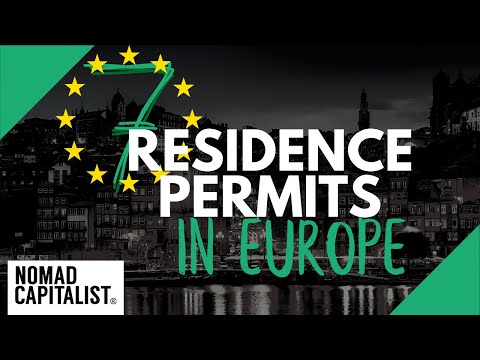
Why Should You Get an EU Residence Permit?
If you’re a fan of Europe, the ideal dream would be to apply for European citizenship through the various programs available. As you know, several European countries like Spain offer citizenship by descent programs.
You can become a European citizen if you prove that your grandparents, and even great grandparents, were Spanish citizens.
But not everyone has ancestry that can be proven. The next best course of action would be to apply for an EU residency. It’s not an EU passport , but it’s a start, especially if you want to travel around the EU as you please.
There are plenty of benefits for you if you decide to legally reside in one EU country, such as:
1. Visa-free Access to Europe
The most obvious benefit of getting a European residence permit is that you can travel without restrictions. Regardless of which one of the EU countries’ permit you get, you can travel all around Europe without any visa restrictions.
That opens the market of 27 countries for you. You can live, work and invest in any of these countries with no restrictions. All you need is one permit, and that is a great deal.
From a business perspective, this is an ideal situation to be in because you don’t have to worry about the paperwork and employment contracts because, as an EU resident , you have the same or almost the same rights as citizens according to the country you’re applying to.
2. Same Rights as European Citizens
As a rule, it doesn’t matter which EU residency program you choose to go through. As long as you have an EU residence permit, in the eyes of the European Union, you are the same as any other European citizen.
This means better opportunities, better healthcare system or a mere health insurance altogether, greater freedom and much more to any third country nationals.
The only difference between an EU resident and a citizen is that you cannot run for office. Apart from that, you have the same rights as a European citizen. There are no additional taxes for EU residents , and you have the protection of the Union to get you out of tricky situations.
3. Ability to Work
The EU work permit is very different to obtain, but as a resident, you should have no problems finding work anywhere in Europe. You can invest in any European country and even set up your business.
The ability to work in different countries on the back of a single EU residence permit is a unique advantage that only you, as a resident, will possess.
4. Long-Term Goals
An EU residence permit allows you to work towards European citizenship . So, if you want to settle in Europe later in the future, then the permit will come in handy.
As you can see, the EU residence permit is a great option for you if you’re interested in European citizenship but are happy with where you’re living right now.
Most people we work with at Nomad Capitalist are interested in EU residency programs because of their flexibility. There are many ways in which you can obtain an EU residence permit.
There are various schemes available for you to choose from. If you’re an investor looking for better business opportunities many Golden Visas in Europe will be convenient. You can easily get European residency by investment; just be sure of what program suits you.
A second residence in Europe can open financial avenues, unlike anything the rest of the world has to offer. Let us explore some of the programs you can benefit from.
The EU Permanent Residence Permit: Golden Visa Program
The best way to get an EU residence permit is by getting a golden visa. EU golden visa programs are very popular these days. They have to be one of the most effective residency by investment programs. It makes upwards of €700,000,000 annually from the Portugal Golden Visa program alone.
Basically, a golden visa allows you to quickly obtain a European residence , making it easier for you to look at investment and offshore banking possibilities in Europe. This is the perfect opportunity for nomads looking to purchase real estate in Europe and working towards citizenship.
The European residency by investment program is referred to as a “Golden Visa” because you’re being handed a golden opportunity to live in some of the most developed countries in the world with the highest standard of living.
If you’re from another western country, you get to experience the charm and history of Europe in a place where you can easily settle in and potentially get a strong second passport .
Who Should Opt for A Golden Visa?
The golden visa provides you with a second residence in Europe. It is particularly useful for:
1. US citizens
We’ve talked about how an increasing number of people choose to renounce their American citizenship. If this sounds like you and you’re looking for a second residence that you can use to work towards a better passport, the golden visa is perfect for you.
The ultimate goal of these people is to gain a Tier A passport that can replace their American one, making traveling even easier for them. Additionally, Europe is a pretty stable place to live in, so it is a good place to settle in.
2. Emerging-world citizens
Citizens from emerging markets and non EU citizens may want a better valid passport to create better opportunities for themselves and their families. Emerging-world citizens often have to go through a long, complicated visa process for most Tier A countries.
They have an even harder time obtaining work visas for countries like the United Kingdom and the United States. By obtaining a golden visa , you will be able to access Europe without worrying about the additional paperwork.
You can easily find a job in any EU country, and if you’re looking for better education opportunities for your children, Europe is definitely the place to be in.
3. Investors and entrepreneurs
Lastly, the golden visa program is perfect for investors, business owners, and entrepreneurs. If you want to be able to live and work in the EU for more than 90 days, you should opt for this program.
Golden visa countries have special tax incentives and financial support systems for business owners who choose to bring their business there. The golden visa program can even lead to tax reductions if planned properly. You need to be efficient.
Benefits of the Golden Visa Program in an EU Country
We recommend the golden visa program over another residence by investment programs due to the following reasons:
1. Fast and straightforward
What makes the golden visa program unique from others is that it is very fast and straightforward. There are normally no additional interviews or application process requirements than needing to know the basic legal and social system of the country. All you need is to show your investment and begin the process.
You will get your EU residence permit in a couple of months. Also, unlike citizenship by investment programs, you don’t have to worry about strict due diligence and eligibility criteria.
2. No residence needed
Other residency programs require you to live in Europe for quite some time each year. With a golden visa however, you can essentially live anywhere you want, and it doesn’t affect the status of your EU residence permit.
3. Family residency
The best part of the golden visa is that you can bring your family members with you as well. The traditional residency program has additional requirements to bring a family member, but with this program, you only have to include your spouse and children in the documentation, and you’re good to go.
7 Easy EU Residence Permits to Get
The golden visa program consists of many European countries, but not all of them. But this doesn’t mean that you will not be able to obtain an EU residence permit from other European countries.
So, in addition to the golden visa countries, we have also accumulated a list of the easiest permanent residency in Europe so you can see which one works for you.
1. Portugal
Portugal has one of the easiest EU residence permits to maintain. You simply have to spend once a week in Portugal to maintain your residence permit. To qualify for the Portugal golden visa , you need to have an investment of €280,000.
There are several ways you can do this, including investing in real estate, government bonds, or hiring a few people for your business. It’s super easy, and you don’t have to worry too much about it either. Your EU residence permit will even act as a visa alternative for countries like Serbia, so this is a great option for you if you’re interested.
For an investment of €250,000, you will have the Greece Golden Visa . It is the cheapest of the Golden Visa programs in the market and offers better real estate investment opportunities.
There are no restrictions on the kind of property you can or the value of the properties if you choose to own several to make up the investment cost. Of course, if you want a Greek passport, it will be harder to obtain, but you just have to spend one day a year to maintain your permit.
If you’re looking for an English-speaking country, then Ireland is good for you. It has close proximity to the UK as well.
It offers various tax incentives to you as well if you’re thinking about moving there for a longer time. Of course, it requires an investment of €1,000,000 or a donation for a residence permit.
Do note that Ireland’s golden visa program does not lead to citizenship, but it’s a great back-pocket residence permit to have.
Update 2022: Russians and Belarusians are now excluded from the Latvia Golden Visa program. Latvia will not issue first-time temporary residence permits to these nationals until June 30th of 2023.
While Latvia requires the same investment of €250,000 as Greece, it does have more limitations when it comes to investment.
However, it is in the Schengen Area, and as an up-and-coming EU country, it has many business opportunities available.
Like Ireland, its Golden Visa program will not lead to citizenship, and your residence permit has to be renewed every five years. But if you want to move to a more Northern European country, Latvia is the place to be.
Cyprus Golden Visa requires an investment of €300,000 in real estate and show proof of at least €30,000 in annual foreign income, and make a deposit of an additional €30,000 in a Cypriot financial institution and hold for three years.
It will not lead to citizenship, but if you’re looking for ways to invest in Cyprus and eventually settle there, this is a good way to go.
Aside from the country’s current status, it still has one of the best “non” golden visa programs to consider when the country’s political climate stabilizes. Ukraine’s residency by investment program is for $100,000 for real estate or business investment.
You just have to show that you’ve made this investment in Ukraine, and they will give you a residence permit. To maintain the permit, you need to spend a day in Ukraine each year.
7. Gibraltar
If you have £2,000,000 in wealth and can either purchase property in Gibraltar or rent an acceptable property, you will get a Gibraltar residence permit . Gibraltar is not part of the golden visa countries, but in the south of Spain, it has a unique position of giving you access to all of Western Europe.
It has a lump sum tax system which could potentially lead you to paying no taxes at all. So, it’s a great backup for your backup as well.
Other EU Residency Alternatives Available
The EU residence permit is a much sought-after commodity leading to an even bigger prize: the EU passport . But not everyone can meet the EU residency requirements. This largely depends on other factors as well.
Many European countries offer citizenship by marriage too. You can even gain citizenship by proving that you are in a serious, committed relationship with an EU citizen of more than two years.
The possibilities are endless. All you need is someone to guide you. That’s where Nomad Capitalist comes in. We’re here to answer all your questions and concerns about European citizenship.
GET ACTIONABLE TIPS FOR REDUCING TAXES AND BUILDING FREEDOM OVERSEAS
Sign up for our Weekly Rundown packed with hand-picked insights on global citizenship, offshore tax planning, and new places to diversify.
Are you a US citizen?
YOU MAY ALSO LIKE

How to Get Serbian Citizenship by Exception
What do Johnny Depp, Steven Seagal, and Ralph Fiennes have in common? Well, apart from the...

How Does Italy’s ‘La Dolce Visa’, Work?
How do you even begin to explain the charm of Italy for expats? Italy's attractions include...

Malta’s Permanent Residence Program: The Ultimate Guide
Arriving in Malta at the break of dawn, the first glimpse of the island emerges from the quiet...

How To Get Dual Citizenship In Ireland
This article covers all aspects of how to get dual citizenship in Ireland. We will first look at...

Does US Allow Dual Citizenship?
Can an American citizen get dual citizenship? The simple answer is yes, but the how is what makes...

How to Get EU Citizenship as an American: The Ultimate Guide
This article discusses how to get EU citizenship as an American, the benefits of an EU passport...
Get the Right Passport for You
We’ve helped our clients obtain 28 different country’s citizenships, from often-overlooked ancestry programs, to fast-tracked investment options, and even exclusive programs for HNWIs. Don’t limit yourself; let Nomad Capitalist’s unbiased approach help you find the best option.
What do you want to accomplish?
Let us know your goal and we will tell you how we can help you based on your details.
REDUCE TAXES OFFSHORE
CREATE A GLOBAL PLAN B
DIVERSIFY AND PROTECT WEALTH

UNITED STATES

UNITED KINGDOM

EU COUNTRIES

Tax Amount ($US Dollars)
POLITICAL INSTABILITY
ECONOMIC INSTABILITY
MISSED OPPORTUNITIES
TRAVEL RESTRICTIONS
HIGH TAX LIABILITIES
RISK MANAGEMENT
MARKET PROTECTION
WEALTH PRESERVATION
OPPORTUNITY CAPITALIZATION
ESTATE PLANNING
Email Address
We handle your data according to our Privacy Policy . By entering your email address you grant us permission to send you the report and follow up emails later.
Frequently Asked Questions
General questions, what is the schengen agreement between european countries.
The Schengen Agreement led to the creation of Europe’s borderless Schengen area in 1995.
The treaty was signed on the 14th of June 1985 near the town of Schengen in Luxembourg. It proposed the gradual elimination of border checks at the signatories’ common borders allowing residents in border areas to cross borders away from fixed checkpoints as well as the harmonization of visa policies.
The Schengen Area operates very much like a single state for international travel purposes with external border controls for travellers entering and exiting the area, and common visas, but with no internal border controls. It currently consists of 26 European countries covering a population of over 400 million people and an area of 4,312,099 square kilometers.
Do I need a Visa to travel to Greece?
To visit Greece, you need to issue a Schengen visa from the Greek embassy in your country.
You may apply for a tourist visa with the usual visa requirements (plane ticket, proof of accommodation and funds to cover your trip expenses).
Alternatively, you can apply for an investor’s visa. On top of the usual visa requirements, you will need to show enough funds to cover the minimum investment amount of €250,000 plus expenses (roughly €280,000 €300,000).
Check more on our guide on how to issue a visa to visit Greece .
About the Residence Permit
How can i obtain a residency permit in greece if i am not a citizen ofthe european union.
You may be granted permanent residence permits in Greece for you and your family, known as Golden visa Greece , upon purchasing a property with a contractual value of min €250.000.
Can I use the residency permit to travel to other European Union countries?
As a resident of Greece you may travel with your passport and the residency permit -without the need of a visa- to the following countries that form part of the Schengen Area:
EU : Austria, Belgium, France, Germany, Denmark, Estonia, Spain, Italy, Latvia, Lithuania, Luxembourg, Malta, Netherlands, Hungary, Poland, Portugal, Slovakia, Slovenia, Sweden, Czech Republic and Finland
NON – EU : Iceland, Norway, Switzerland and Liechtenstein
You may also travel to any Schengen member country directly from your country of origin. You do not need to go through Greece first.
Does the residence permit give me the right to apply for citizenship?
After seven years of continuous residency, you may apply for Greek citizenship.
See our Greek residency law page for more information.
How long is the residency permit valid and what happens next?
The Greek residency permit is permanent. The only criterion is property ownership.
The permit needs to be renewed every five years, indefinitely. But do not worry, there is no need to visit Greece to do this. We will do it on your behalf. Children who reach the 21st year can extend their permit for 3 more years. However, after the age of 24, they cannot be part of the group family permit.
Am I required to go through your company in order to file the residency application?
The residency permits issuance is part of our total service package . We have the means to do it fast and effectively. We are the market leaders in this business sector with more than 350 issued permits. No need to look elsewhere. Our fee is money well spent.
Who deals with the authorities in order to issue the residency permit?
We do. It is part of our services portfolio to handle all the necessary paperwork on behalf of the applicant. We collect all required documents, we submit the applications for all family members, we collect and deliver the residency cards to the holders.
What is the necessary paperwork for my residency application?
No need to worry about the paperwork at this stage. When the time comes, our people will guide you step-by-step.
Visit this page for more info.
Buying a property in Greece
Can i buy the property through my company abroad.
You may purchase the property through a legal entity if you are its only stockholder.
Are there any extra charges apart from the net value of the property?
The total cost is roughly 12% on top of the property price. This includes all taxes, fees and expenses: Property transfer tax, legal and notary fees, land registry fees, stamp duty, residency vouchers for all family members.
Please note that we offer a no hidden costs guarantee . Every customer receives a detailed cost breakdown from the very beginning of the process.
Can I obtain more than one piece of property?
Yes, you can buy one or more properties, commercial and/or residential, provided that their combined value is equal to or greater than €250.000.
Are the properties that you represent freehold or leasehold?
First, let’s point the difference between leasehold and freehold.
Freehold means that the property is fully owned for an unlimited period of time.
Leasehold means that a person has the right to use a property for a set period of time, subject to the payment of annual ground rent as specified by the lease. At the end of the term, the property reverts back to the freehold owner. The lease in some cases may be granted for up to 999 years.
ALL properties in Greece are freehold.
Can I share the investment with another party?
Only spouses can share the investment and jointly own the property of total value €250.000 or higher.
ActivadorCrack is a comprehensive online platform that offers numerous software cracks, keygens, and updates for a variety of applications. Our website provides an extensive library of pirated software, allowing users to access premium features without purchasing costly licenses. With an intuitive interface, our extensive library is easily navigable, allowing users to rapidly locate the required software. Prioritizing the security and safety of our visitors, we exhaustively scan all cracked software files for malware and other potential threats.
In all other cases of shared ownership, the right of residence is granted only if the amount invested by each co-owner reaches a minimum €250.000.
Example: Two families can have two separate permits for all members if they purchase jointly a property of value equal or higher to €500,000.
Which family members may accompany the main investor?
Together with the main investor the following family members may be included in the group residency permit:
Investor’s spouse, children up to the age of 21, parents of main investor and parents of the spouse.
What are my obligations as property owner in Greece?
You have a few obligations when you become a property owner in Greece.
- You file an annual tax report.
- You pay a yearly property tax.
- If you rent your property you will pay income tax.Our portfolio of after-sale services will answer all your relevant questions. Click here to see more detailed info.
My new property may need some services like cleaning, maintenance etc. Who will take care of all these?
We offer all kinds of services to support your investment.
- We will manage your property and take care of the rental procedure.
- We will file your annual tax report and pay the taxes and possible maintenance expenses.
- We will represent you in your dealings with the Greek authorities.
Where do I start?
The first thing to do is to arrange for a trip to Greece. Our representatives will explain the program in detail and show you properties based on your criteria. You will be required to send your bank documents -by email- before the visit so that our people can check the documents and suggest possible corrections. During your stay and if you are in a position to decide, we will complete the initial formalities.
- Sign the total cost agreement.
- Open a Greek bank account.
- Sign the power of attorney agreement.
- Pay an initial “commitment” deposit.
Check our detailed guide about what you need to know about the Visa process .
The Golden Visa Program
Are there any nationalities excluded from entering the greek golden visa program.
Absolutely not. The Greek constitution strictly forbids any kind of discrimination. Everyone is welcome to apply.
Are same sex couples eligible to enter the Greek Golden Visa Program?
Yes, they are. The main requirement is for the couple to have a valid civil partnership or cohabitation agreement. The agreement must be accepted by the European Union laws.
Living in Greece
How about my children’s education.
Your children have full access to both state and private schools and universities. Public education in Greece is free of cost. There are tuition fees only for specific postgraduate courses.
There are 29 universities in Greece offering a variety of courses. The teaching language is Greek and foreign students are asked to go through a one-year crash course in the Greek language in order to attend.
There are also universities who offer courses in English.
What about access to health services?
Holders of the residence permit have access to the Greek public health system in the same way as Greek citizens.
The Greek National healthcare system occupies the 14th spot in the international ranking, one of the best in the world, according to the World Health Organization. It consists of 140 large hospitals (+7 university hospitals), 250 local health centers and 1500 rural outpatient clinics.
Residence permit holders and their family members must possess a private insurance policy that covers their healthcare expenses.
If I own the property and reside in Greece, can I and the people that accompany me work?
The residency permit through investment does not allow access to the job market. Holders of this type of residency permit can set up their own business in Greece. They can be shareholders and CEOs.
Can I purchase and drive a car with Greek license plates?
Yes, under the specific regulations of the Ministry of Transport, which apply to non-EU citizens.
Javascript est desactivé dans votre navigateur.
République Française
Service-Public.fr
Le site officiel de l’administration française
- Se connecter
- Accéder au site pour les entreprises
This page has been automatically translated. Please refer to the page in French if needed.
Share the page
Link copied
Le lien vers cette page a été envoyé avec succès aux destinataires.
Can you settle in france with a european residence permit.
Verified 01 January 2024 - Legal and Administrative Information Directorate (Prime Minister)
A natural or legal person established in an EU country providing temporary paid service in another Member State under the same conditions as those imposed by that country on its nationals
Yes, if you are a non-European foreigner and legally reside in another European Union (EU) country, you can come and live in France under certain conditions.
Depending on the nature of your residence permit and your status in your country of origin, your steps will be different to enter and stay in France:
Répondez aux questions successives et les réponses s’afficheront automatiquement
You have an EU Blue Card
You can get a talent passport residence card - eu blue card - employment under 2 conditions: you already have a European Blue Card and you stayed at least 18 months in another EU countries .
You have to ask for it within one month of your entry in France.
You are a long-term EU resident
This status is granted to you by EU countries (except Ireland and Denmark) if you are a non-European foreigner after 5 years of legal and uninterrupted stay in their territory. It permits the issue of a residence permit EU long-term resident .
If you have this residence permit, you can enter and settle in France without having to apply for a long-stay visa (for more than 3 months).
Within 3 months of your entry into France, you must submit an application for a residence card.
Depending on your situation, this may be one of the following:
- Temporary residence permit "visitor"
- Student temporary residence card
- Multi-annual residence card "talent passport" (researcher or artistic and cultural profession)
- Temporary residence card "employed" or "temporary worker"
- Temporary residence permit "entrepreneur/professional"
You must meet the requirements to obtain the title (for example, if you are an employee, you must have obtained authorization to work in France ).
You must also prove that you have sufficient and stable resources to live in France (possibly with your family) and health insurance.
Your resource amount must be at least €1,766.92 (monthly gross) if you are not the owner of your accommodation (or free accommodation).
you do not have to apply for a residence card if you come to work in France as an employee posted by a service provider in the context of a cross-border service. The same is true if you are one cross-border service provider .
Accompanying family
Your husband and children living with you in your European country of origin can accompany you or join you in France, under conditions.
Within 3 months of entering France, adults in your family must apply for temporary residence card private and family life .
If your family did not live with you in your European country of origin, you will need to request a family reunification in France.
You're in another case
You must apply for long-stay visa (more than 3 months) to enter France in order to request a residence permit to settle you.
This visa is required even if you have a permanent or unlimited residence permit in your country of origin.
Who can help me?
Find who can answer your questions in your region
Telephone administrative information - Allo Public Service
For more information on this topic, you can contact Allô Service Public.
Cost: free service
The informants who answer you belong to the Ministry of the Interior.
Attention: the service does not have access to users' personal files and cannot therefore provide information on their status.
The service is available at the following times:
- Monday: 8.30am to 5.30pm
- Tuesday: 8:30 to 12:15
- Wednesday: 8:30 to 12:15
- Thursday: 8.30am to 5.30pm
- Friday: 1 p.m. to 4:15 p.m
- Lundi : de 08h30 à 17h30
- Mardi : de 08h30 à 12h15
- Mercredi : de 08h30 à 12h15
- Jeudi : de 08h30 à 17h30
- Vendredi : de 13h00 à 16h15
Request a call
Statute and miscellaneous references
Directive 2003/109/EC of 25 November 2003 on the status of third-country nationals who are long-term residents
Articles 14 to 23
Code of entry and residence of foreigners and right of asylum: Articles L426-11 to L426-16
Temporary residence card issued to the beneficiary of "long-term EU resident" status in another European country
Code of entry and residence of foreigners and right of asylum: Articles R426-4 to R426-6
Additional topics
European Union countries
European Commission

Can I live and work in another EU country?
The EU permanent residence permit is a specific form of permanent residence permit. With an EU permanent residence permit, you have the option of obtaining a residence permit in other EU countries; that is, under certain conditions, you can live and work in another EU country. The EU permanent residence permit has unlimited validity. You can also apply for it in addition to a permanent residence permit. With a permanent residence permit, you may stay in another EU country for up to 90 days but are not allowed to live or work there. You can find out more about permanent residence permit in our chapter " permanent residence permit ".
Please note: On July 7th, 2023, a new skilled worker immigration law was passed. It includes numerous changes and amendments to facilitate the immigration of skilled workers and make Germany more attractive to them. It is unclear when exactly these changes and amendments will be enforced. When the time comes, we will update our website– we encourage you to visit us regularly to stay well informed. If you have any further questions, you can always visit our community platform, “ Together in Germany ”– our community managers will be happy to help!
What do I need to know?
You need to meet the following requirements to obtain a permanent residence permit:
- You may not receive benefits from the jobcentre or social welfare office currently or in the future; which means you have to be able to cover all your expenses with your wages.
- You have to speak German at level B1 and provide relevant evidence.
- You must have enough living space for yourself and your family. The standard size varies from state to state- ask the staff responsible for you at the Immigration Office or a counselling centre for more information.
- You must have completed the orientation course. The orientation course is part of the integration course, where participants learn about the society and history of Germany.
- You must not have committed any major crime.
- You must have had your residence permit for at least five years.
- If you are entitled to asylum, recognised refugee or beneficiary of subsidiary protection, the duration of your asylum procedure is also included.
Important : If you have been issued a residence permit as a result of being entitled to a national ban on deportation, you cannot apply for an EU permanent residence permit.
- Copied to clipboard Copy link
You can apply for an EU permanent residence permit at the appropriate Immigration Office. To do so, you need to take the same steps described in the section "Where can I apply for a permanent residence permit?". You then can go ahead and apply for a residence permit from the EU country of your choice. You can find out how in the next sections.
When you have an EU permanent residence permit and would like to live in another EU country, you need to apply at the Immigration Office of the country in question. For other EU state to issue you a residence permit, you need to meet the following conditions:
- You need to have an EU permanent residence permit
- You may not depend on any financial support from the state for your living.
- In principle, you need to introduce a contract (or alike) signed by your expected employer or an enrolment certificate (or alike) from the university you are planning to attend in the relevant country
- You need to have health insurance
When the Immigration Office in the other country accepts your application, in principle, you also need to apply at the relevant Employment Agency for a work permit which allows you to work there.
Please keep in mind: Denmark and Ireland have not implemented the corresponding EU Directive. In these countries, you cannot apply for a residence permit based on your EU permanent residence permit.
Yes. Under the following conditions, you may lose your EU permanent residence permit:
- Your EU permanent residence permit may be revoked if you have obtained it as a result of providing false information to the authorities.
- If you are considered to be a threat to public safety and order, you may be deported. In this case, you will also lose your EU permanent residence permit permit.
- If you reside outside the European Union (or in Denmark or Ireland) for more than 12 months, in principle, you will lose your EU permanent residence permit.
- If you do not reside in Germany for more than 6 years, in principle, you will lose your EU permanent residence permit.
- If you obtain a long-term residence permit from another EU country, you will lose your EU permanent residence permit.
- If you have been granted an EU permanent residence permit-based on your recognition as a refugee or your entitlement to asylum, subsidiary protection or national ban on deportation- travelling to your home country may lead to revocation of your protection status and consequently, your residence permit. When your recognition is invalidated, the immigration office has two options: 1. They may also revoke your EU permanent residence permit. 2. They may uphold your EU permanent residence permit. The latter usually happens when you have been in Germany/European Union for a long time, are linguistically well-integrated and have a job with no need for state benefits (from the Jobcentre or Social Welfare Office). The Immigration Office is the sole authority who decides between the two options mentioned above ( §52 I Residence Act ).
The EU permanent residence permitis not the only way to obtain rights of residence in other EU countries. Qualified workers can often obtain other types of residence permits. Seek advice from counselling services and authorities in the relevant country. You can also find more information in our chapter “ Immigration to Germany ”.
Similar Articles
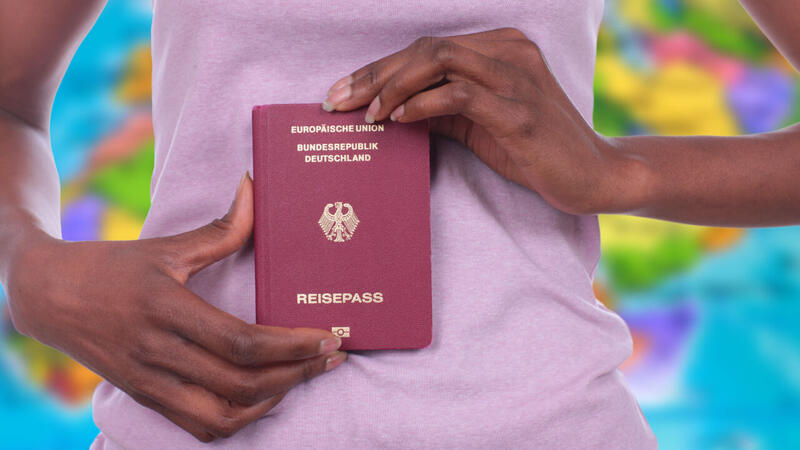
Naturalisation
Can I become a German citizen? Which requirements do I have to meet for the application? How much does the application cost?
- Read more about Naturalisation

Permanent Residence Permit for Immigrants
Can I obtain permanent residence permit and settle in Germany? Where and how can I apply? What requirements do I need to meet?
- Read more about Permanent Residence Permit for Immigrants

Can I stay in Germany permanently?
Can I stay in Germany permanently? Which requirements do I need to meet for obtaining permanent residence permit? Where can I seek[...]
- Read more about Permanent Residence Permit for Refugees
Additional Links
The Adult Migration counselling Service (MBE) offers support to adults (+27) on the topic of vocational training in many different languages.
The counselling centres of the Youth Migration Service (JMD) offer support and advice to refugees and migrants under the age of 27 on various topics in many different languages.
In the BAMF online test centre, you can prepare yourself for the naturalisation test.
Gefördert durch:

IMAGES
COMMENTS
Permitted residence permits: A valid residence permit from any Schengen country; Entry granted: 180 days; Entry rule: Schengen visa must be valid for at least 6 months from the day of arrival; Official source: Ministry of Foreign Affairs of Peru; RELATED: 18 countries you can visit VISA-FREE with an Australian visa or PR in 2024 *** Europe
Passport or other travel document always required. You always need a passport or other travel document for a journey abroad. This is also the case for a journey within the Schengen Area. Your passport or travel document must not have been issued more than 10 years ago. The passport or other travel document must also be valid for at least ...
Schengen visa holders can visit 76 countries visa free. Top countries include Albania, Andorra, Aruba and Austria. ... Andorra la Vella • Southern Europe. ... Schengen Residence permit It's important to note, however, that visa exemption policies can vary by country and may be subject to change at any time, so it's always best to check the ...
The Schengen visa allows foreign nationals to enter any country in the European Union with a single entry permit. However, in addition to the countries that signed the Schengen agreement, a Schengen visa allows holders to visit several other countries that aren't in the European Union or the Schengen zone— provided they hold a valid multiple entry visa for tourist or business, purposes.
An EU residence permit is an official document issued by a member state of the European Union that allows a non-EU national to live and work in any EU country for a specified period of time. The permit is also sometimes referred to as a "residence card" or "EEA residence permit". EU residence permits grant their holders the right to ...
Passport, entry and visa requirements. If you are a national from a country outside the EU wishing to visit or travel within the EU, you will need a valid passport and possibly a visa. Your passport should be valid for at least 3 months after the date you intend to leave the EU and it must have been issued within the last 10 years.
A residence permit issued by Austria, Portugal, Greece, Switzerland, or Spain, as well as a Maltese residence permit or permanent residence in Malta, permits the holder to travel both in the European Union and the Schengen countries without a visa. Residents of Bulgaria, Romania, Croatia and Cyprus cannot visit the Schengen area without a visa.
Status: ACTIVE. Valid For: Citizens of Republic of the Congo, Guinea, Israel, Mali, and Thailand. Visa Policy: Can obtain an online eVisa. Entry Requirement: Any valid Schengen visa, OR residence visa from any Schengen country that is valid at least 180 days on date of evisa application.
The difference between a residence permit and EU citizenship is that you can pay for residence in countries with the Golden Visa program or live in EU countries for 5 years to become a permanent resident. However, you can acquire citizenship by: Being born in Europe. Having European family members. Being a permanent resident for at least 10 years.
Permanent residence. Reporting your presence and registering your residence. Can you be requested to leave or be deported? Permanent residence. Допомога ЄС Україні. EU assistance to Ukraine. Find out everything you need to know about living in another EU country whether you're employed, a student, a pensioner, or a jobseeker.
To obtain a residence permit for a second EU country, you may have to show that you have one or more of the following: ... If your long-stay visa or residence permit has been issued by a Schengen area country, you can travel to another Schengen area country for 90 days per 180 day period. You must:
EU Long Term Residence Permit Fee. The costs for an EU long-term residence permit differ from one EU country to another. The countries charge applicants as much as their nationals pay for their identity cards. I.e. in the Netherlands, adult applicants need to pay €171, whereas in Germany applicants need to pay a fee of €109.
@Karen no, it is not the question. Residence permit legally gives you right to travel across Schengen area. What is not clear is that is it sufficient or you need passport with it. Dutch/EU nationals can travel with just their National ID, I think residence permit is not really an ID on its own, and non-EU folk possibly have to carry passports.
One of the main requirements to gain residency in Austria is to prove you make enough money. If you will be living alone, you need to show proof you earn €1,030.49 monthly, whereas if you live with a partner/spouse, this amount for the both of you increases to €1,625.71. An additional amount of €159.00 is required for each child.
As a Digital Nomad, I often receive questions about traveling to different countries and the requirements for entry. One question that frequently comes up is whether someone can travel to Ireland with an EU residence permit. Based on the information available, I can provide some insights and answers to the most common queries regarding this …
Non-EU citizens living in one of the countries that do apply the agreement fully (so-called Schengen States) with a valid residence permit do not need a visa for visits to Germany of up to 90 days ...
Visa requirements for non-EU family members with a residence document . If your non-EU family member has a residence card or a residence permit issued by a Schengen area country they may not need a visa. Using the tool below, check if they need an entry visa for the country they are travelling to.
Travelling when you have a residence permit. If you have been granted a residence permit in Finland, or a residence card for a family member of an EU citizen in Finland, you may travel in the Schengen area without a visa for up to 90 days out of any 180-day period. When you travel, you must bring with you your passport and residence permit card ...
7. Gibraltar. If you have £2,000,000 in wealth and can either purchase property in Gibraltar or rent an acceptable property, you will get a Gibraltar residence permit. Gibraltar is not part of the golden visa countries, but in the south of Spain, it has a unique position of giving you access to all of Western Europe.
As a resident of Greece you may travel with your passport and the residency permit -without the need of a visa- to the following countries that form part of the Schengen Area: EU : Austria, Belgium, France, Germany, Denmark, Estonia, Spain, Italy, Latvia, Lithuania, Luxembourg, Malta, Netherlands, Hungary, Poland, Portugal, Slovakia, Slovenia ...
If you have an Indian passport and a residence permit from any EU country not just the Schengen countries like Ireland, Romania, and Bulgaria, you can visit Montenegro without a visa.
It permits the issue of a residence permit EU long-term resident. If you have this residence permit, you can enter and settle in France without having to apply for a long-stay visa (for more than ...
In European Union countries, for instance, 3.7 million first residence permits were issued in 2022 to non-EU citizens, a 26% increase (+753445 permit) from 2021. While there are various ways to ...
The EU permanent residence permit is a specific form of permanent residence permit. With an EU permanent residence permit, you have the option of obtaining a residence permit in other EU countries; that is, under certain conditions, you can live and work in another EU country. The EU permanent residence permit has unlimited validity. You can also apply for it in addition to a permanent ...
Liberia National Bar Association (LNBA) 2024 Assembly
USDA does not allow travelers to bring back most poultry meat or poultry meat products from countries affected with certain serious poultry diseases:. Highly pathogenic avian influenza; Newcastle disease; To find out a country's status for these diseases, visit our animal disease status page.. Commercially-packaged and labelled, cooked, shelf-stable poultry items from affected countries that ...